Here are the most beautiful Blue Flowers that will surely add a touch of royalty to your garden! We have the best ones around the world!
Blue flowers bring a sense of calmness and tranquility to your outdoor space. If you’re looking for blue flowers to grow in your garden, there are plenty of options. Here are some of the best ones.
Note: True blue flowers are rare, and along with them, we have also added flowers that are of similar shades, like purple, violet, and lavender.
Best Blue Flowers
1. Jacquemontia
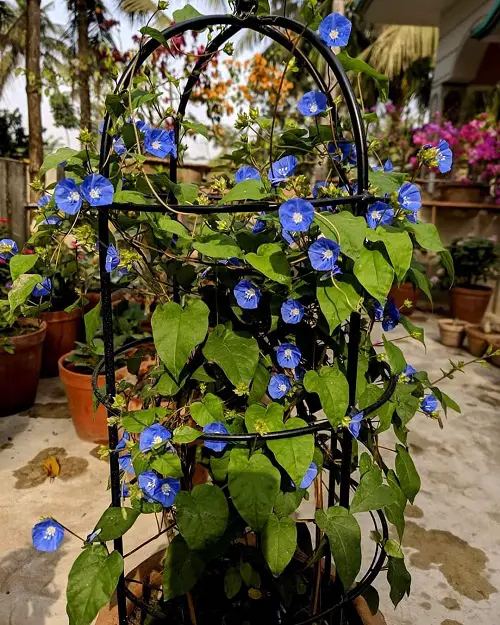
Botanical Name: Jacquemontia
USDA Zones: 8-11
Size: 2-3 feet
Jacquemontia flowers are a member of the Convolvulaceae family, which includes morning glory and sweet potato vines.
2. Yesterday, Today, and Tomorrow
Botanical Name: Brunfelsia pauciflora
USDA Zones: 7-10
Size: 3-6 feet
These flowers are quite unique and show an interesting color change. They start as mauve but turn lighter as they age, eventually becoming white.
3. Agapanthus
Botanical Name: Agapanthus africanus
USDA Zones: 8-11
Size: 2-4 feet
Agapanthus is a beautiful blue flowering plant for your garden. It is relatively easy to grow and can be planted in gardens, containers, or indoors.
4. Aster
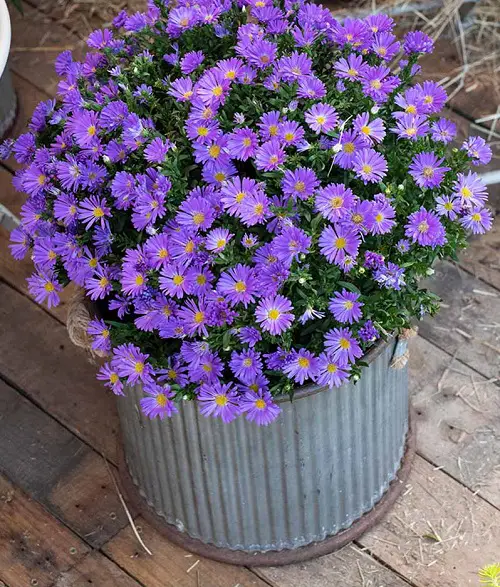
Botanical Name: Aster amellus
USDA Zones: 3-9
Size: 1-3 feet
Asters are a group of plants that produce daisy-like flowers. You can find these in shades of blue, pink, purple, and white.
5. Beth’s Blue
Botanical Name: Isotoma axillaris
USDA Zones: 8-10
Size: 0.5-1 feet
Beth’s Blue is a great addition to any garden or landscape. It provides vibrant color and attracts pollinators such as bees and butterflies.
6. Birdbill Dayflower
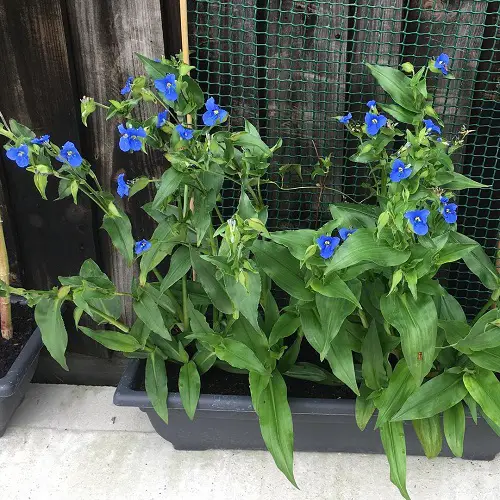
Botanical Name: Commelina dianthifolia
USDA Zone: 6-9
Size: 1-2 feet
Bird’s Bill Dayflower is a spiderwort family member known for its attractive blue flowers. It has long, dark leaves to complement them, too.
7. Blue Orchid
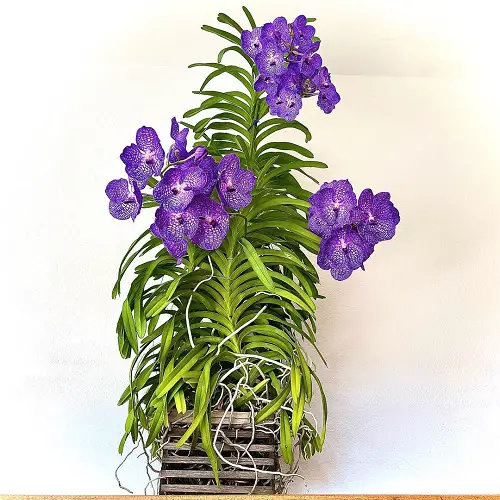
Botanical Name: Vanda coerulea
USDA Zones: 9-11
Size: Usually 1-1.5 feet but varies
Blue orchids are usually tricky to find and are hybrid or dyed plants. The most commonly known blue orchid is the “Moth Orchid.”
8. Butterfly Pea
Botanical Name: Clitoria ternatea
USDA Zones: 10-11
Size: 6-8 feet
The butterfly pea is not only the best blue flower plant but is also used in traditional medicine and cooking. The plant loves the full sun and prefers slightly acidic soil.
9. Bellflower
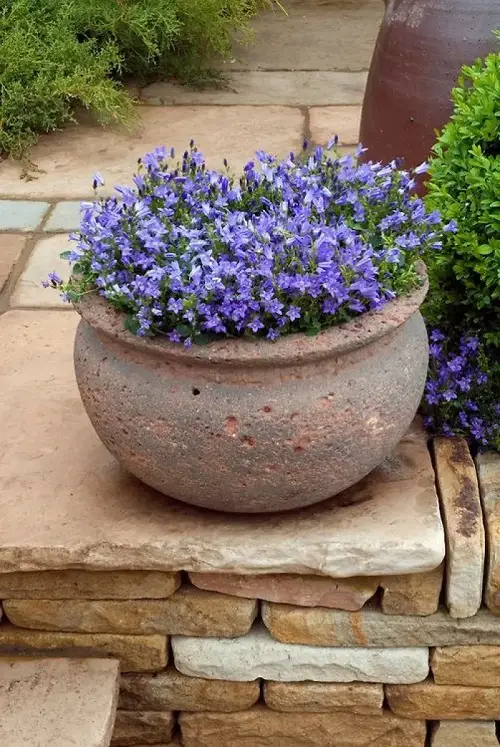
Botanical Name: Campanula spp.
USDA Zones: 3-11
Size: Less than 1 foot
Bellflowers are annuals or hardy perennials and can survive winter temperatures in most regions. You can simply propagate them through either division, stem cuttings, or seed.
10. Blue Columbine
Botanical Name: Aquilegia caerulea
USDA Zones: 3-8
Size: 1-3 feet
To provide a beautiful, unique blue and white addition to your space. You can go with the blue Columbine. It attracts hummingbirds as well.
11. Blue Flag Iris
Botanical Name: Iris versicolor
USDA Zones: 2-7
Size: 2-3 feet
Blue flag iris is a native North American plant that produces lovely blue or purple flowers in late spring to early summer.
12. Blue Ginger
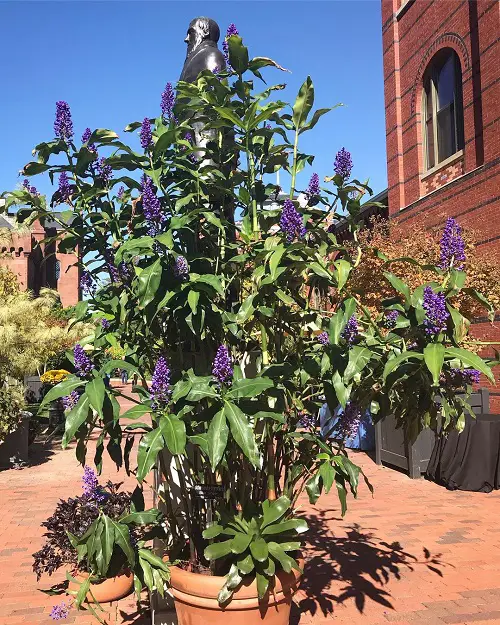
Botanical Name: Dichorisandra thyrsiflora
USDA Zones: 10-12
Size: 3-6 feet
To add a tropical flair to your garden, you should definitely add blue ginger. It grows best in full sunlight and well-draining soil.
13. Balloon Flower
Botanical Name: Platycodon grandiflorus
USDA Zones: 3-8
Size: 1-3 feet
Balloon flowers are beautiful and easy-to-grow plants that can add a whimsical touch to your garden or patio.
14. Blue-Eyed Grass
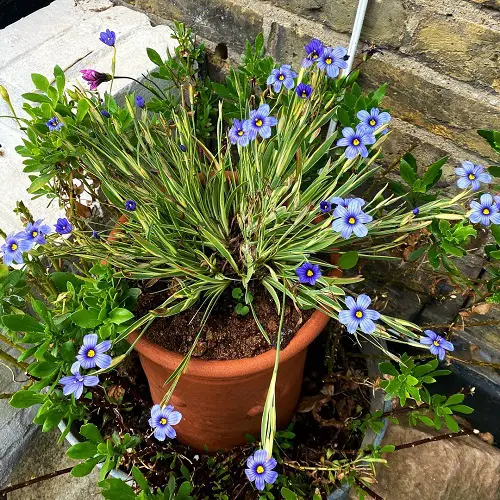
Botanical Name: Sisyrinchium angustifolium
USDA Zones: 4-11
Size: 0.5-1 feet
Blue-eyed grass is a great choice for adding color and texture to a wildflower garden. It is also nice for naturalized areas.
15. Blue Primrose
Botanical Name: Primula acaulis
USDA Zones: 4-7
Size: 0.5-1 feet
Blue primrose is a compact and colorful flowering plant with bright blue flowers that bloom in the spring.
16. Blueblush
Botanical Name: Helianthemum ‘Blue’
USDA Zones: 6-8
Size: 0.5-1 feet
Blueblush is a low-growing evergreen shrub that produces beautiful blue flowers. They also have a blush of pink or white.
Best Orange Wildflowers You Can Grow in Your Yard
17. Blue Flossflower
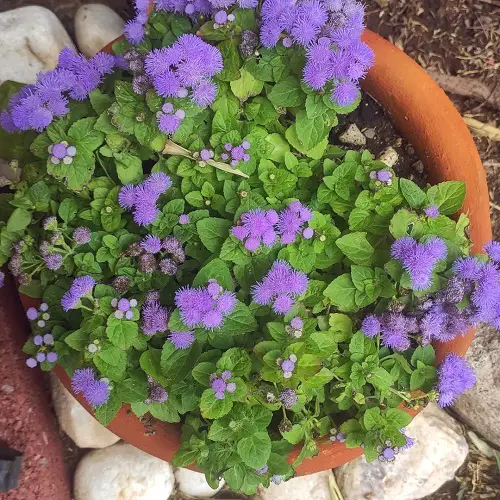
Botanical Name: Ageratum houstonianum
USDA Zones: 2-11
Size: 0.5-1.5 feet
Blue Flossflower is a great choice for adding blues or purples to your garden. Their unique blue-lavender hue goes well with terracotta pots.
18. Blue Lupine
Botanical Name: Lupinus perennis
USDA Zones: 3-8
Size: 1-2 feet
If you want to add blue colored flowers that have good height, the Blue lupine is a great choice.
19. Blue Mist Shrub
Botanical Name: Caryopteris
USDA Zones: 5-9
Size: 2-3 feet
The Blue Mist Shrub is a deciduous one that produces soft blue flowers in late summer and early fall.
20. Blue Larkspur
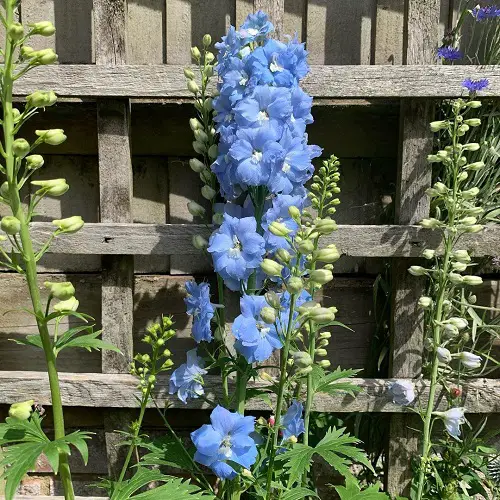
Botanical Name: Delphinium nuttallianum
USDA Zones: 4-8
Size: 2-4 feet
The tall and fragile blue Larkspur is a dramatic plant that adds height and color to your garden or landscape.
21. Blue Daze
Botanical Name: Evolvulus
USDA Zones: 8-11
Size: 0.5-2 feet
To enjoy blue blooms throughout the summer – you must plant blue dazes in your garden.
22. Blue Passionflower
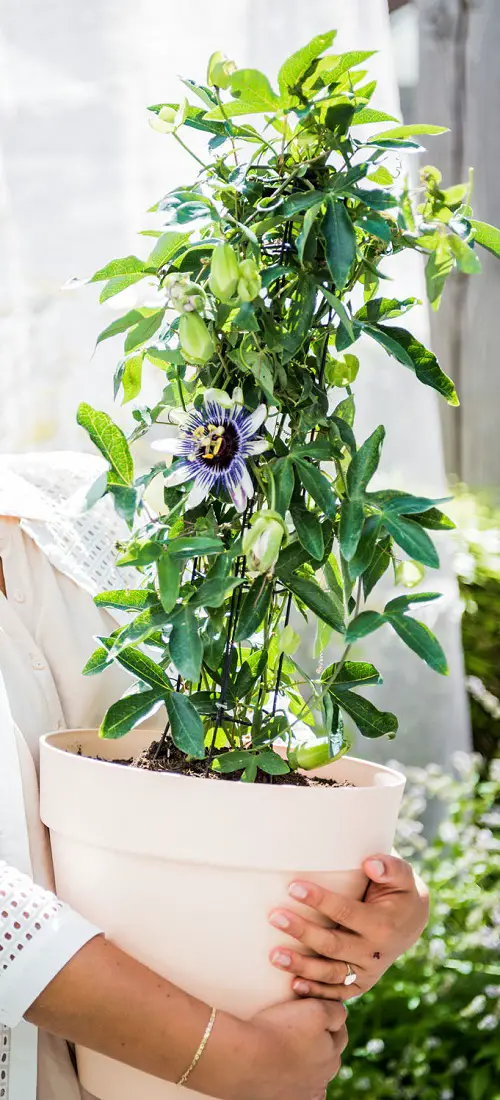
Botanical Name: Passiflora caerulea
USDA Zones: 6-11
Size: 10-20 feet
Blue Passionflower is a stunning perennial vine that produces unique blue and white flowers from summer to fall.
23. Blue Fan Flower
Botanical Name: Scaevola aemula
USDA Zones: 10-11
Size: 0.5-1 feet
Blue Fan Flower’s trailing habit and vibrant blue flowers make it stand out in any setting.
24. Blue False Indigo
Botanical Name: Baptisia australis
USDA Zones: 3-9
Size: 3-4 feet
If you want to add texture to your garden, then you should definitely go with the Blue False Indigo.
25. Blue Tickseed
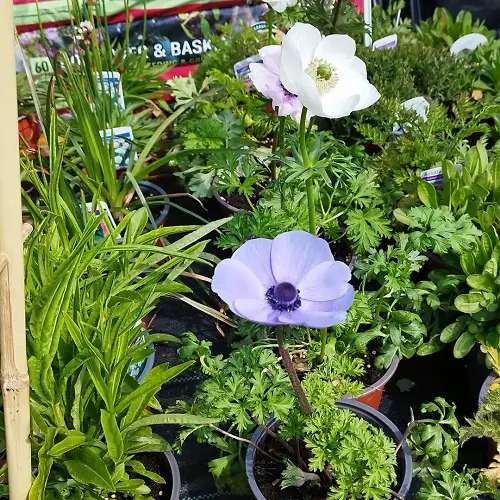
Botanical Name: Coreopsis
USDA Zones: 4-9
Size: 1-3 feet
Blue Tickseed is a unique blue flower with a hardy nature. It looks pretty in containers and makes lovely garden borders.
26. Blue Star Creeper
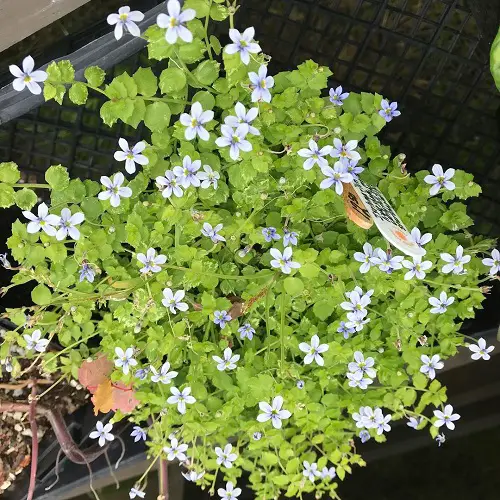
Botanical Name: Laurentia fluviatilis
USDA Zones: 6-9
Size: 0.5-1 feet
Blue Star Creeper is a low-growing perennial plant that produces small, star-shaped flowers in light blue hues.
27. Blue Statice
Botanical Name: Limonium sinuatum
USDA Zones: 8-11
Size: 1-2 feet
Blue Statice is an annual plant that produces clusters of small, papery blue flowers on long, slender stems.
28. Blue Fringed Sage
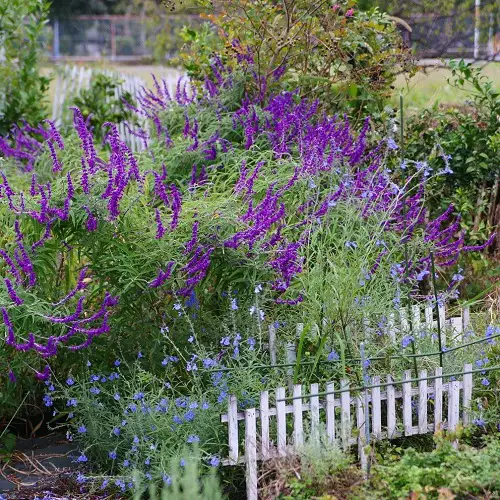
Botanical Name: Salvia azurea
USDA Zones: 5-9
Size: 3-6 feet
Blue-fringed sage is a beautiful and low-maintenance plant to add color and texture to your garden or landscape.
29. Blue Geranium
Botanical Name: Geranium dissectum
USDA Zones: 4-9
Size: 1-4 feet
Geraniums, also known as cranesbills, are a popular and easy-to-grow perennial plants. These flowers have light yellow centers.
30. Blue Balloon Vine
Botanical Name: Cardiospermum halicacabum
USDA Zones: 10-11
Size: 3-12 feet
Blue balloon vine is a beautiful plant that can add interest to your garden. It has star-shaped blooms with 6 tips.
31. Blue Pimpernel
Botanical Name: Anagallis monellii
USDA Zones: 7-10
Size: 0.5-1 feet
Blue pimpernel is a charming and low-maintenance plant. It has minimal leaves and plenty of small flowers adding to the appeal.
32. Bluebell Vine
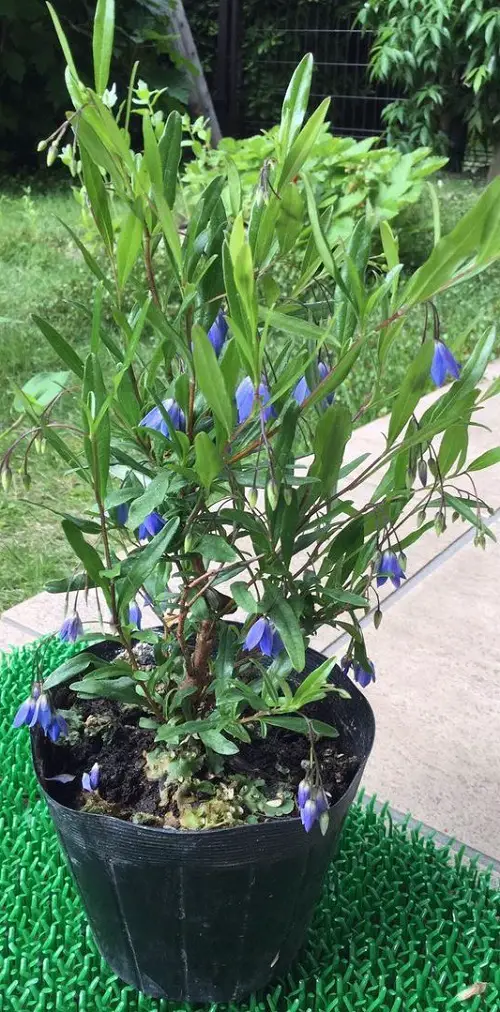
Botanical Name: Billardiera heterophylla
USDA Zones: 8-10
Size: 3-12 feet
Bluebell vine, also known as Australian Bluebell creeper, is a beautiful and easy-to-grow climber. Its blue-purple flowers resemble small bells.
33. Blue Sky Vine
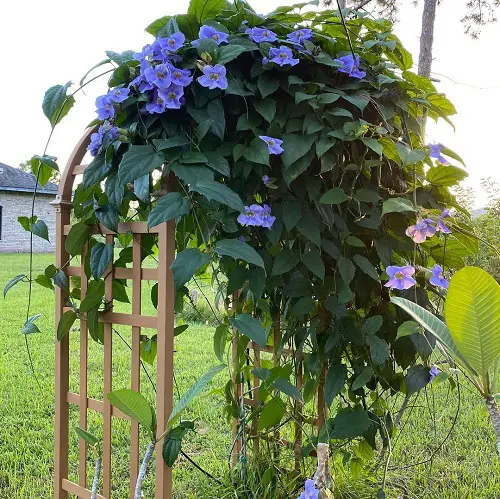
Botanical Name: Thunbergia grandiflora
USDA Zones: 9-11
Size: 15-30 feet
The beautiful and fast-growing blue sky vine produces stunning sky-blue flowers with dark centers – this can be a great addition to your lawns.
34. Blue Woodruff
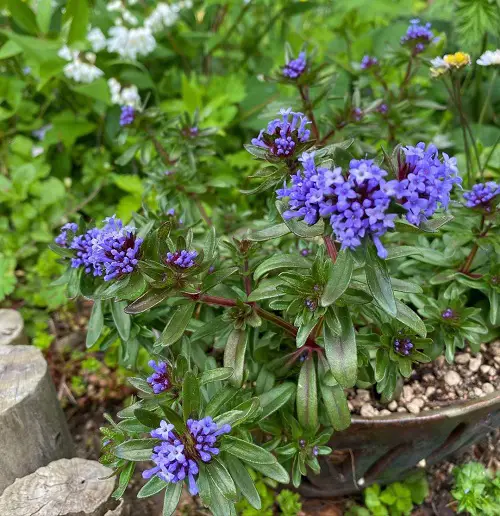
Botanical Name: Asperula orientalis
USDA Zones: 4-10
Size: 0.5-1 feet
Blue Woodruff is a lovely herbaceous perennial plant that produces delicate clusters of small blue flowers in the spring and summer.
35. Blue Foxglove
Botanical Name: Digitalis purpurea
USDA Zones: 4-9
Size: 2-5 feet
Foxgloves can reseed themselves and return year after year, providing a stunning display of blue flowers.
36. Blue Creeping Phlox
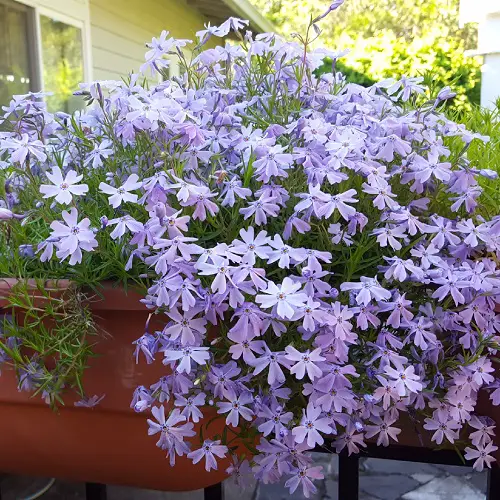
Botanical Name: Phlox subulata
USDA Zones: 3-9
Size: Less than 1 foot
Planting blue creeping phlox is a great way to create a lovely ground cover. These cascade beautifully over rocks and walls.
37. Blue Dwarf Iris
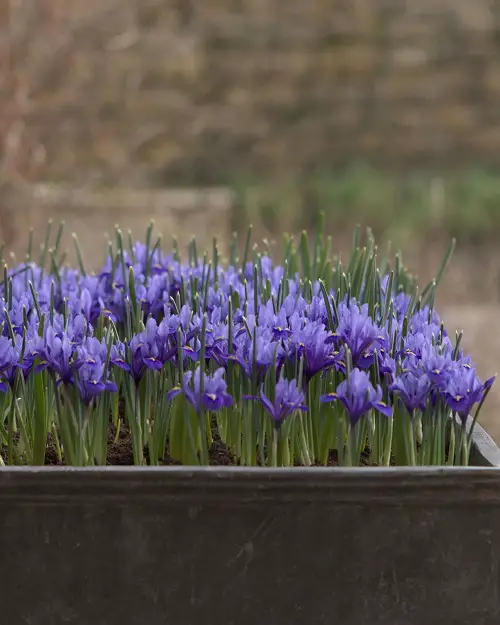
Botanical Name: Iris reticulata
USDA Zones: 5-8
Size: Less than 1 foot
The tiny blue dwarf iris is a striking spring-flowering bulb that produces gorgeous blue-purple flowers with yellow markings.
38. Blue Dayflower
Botanical Name: Commelina communis
USDA Zones: 6-9
Size: 1-2 feet
Blue dayflower is a low-maintenance plant that can spread quickly, making it a great choice for ground cover or edging.
39. Blue Water Hyacinth
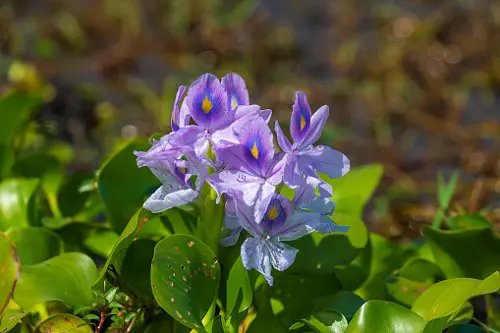
Botanical Name: E. crassipes
USDA Zones: 8-11
Size: 1-3 feet
Blue Water Hyacinth is an aquatic plant with lovely blue-purple flowers that float on the water’s surface. Nothing can match the aesthetic of these blooms.
40. Blue Butterfly Bush
Botanical Name: Buddleja davidii
USDA Zones: 5-10
Size: 6-12 feet
Blue butterfly bush is a deciduous shrub that produces clusters of fragrant, butterfly-attracting flowers in shades of blue and purple.
25 Stunning Red Flowers With Yellow Center
41. Blue Dahlia
Botanical Name: Dahlia pinnata
USDA Zones: 8-10
Size: 1-3 feet
Dahlias are beautiful, easy-to-grow flowers that come in a wide variety of colors, including blue and shades of lilac and lavender.
42. Blue Hibiscus
Botanical Name: Alyogyne huegelii
USDA Zones: 5-11
Size: 3-6 feet
Blue hibiscus is a beautiful and easy-to-grow plant that is perfect for adding a pop of color to any garden.
43. Blue Phlox
Botanical Name: Phlox divaricata
USDA Zones: 3-8
Size: 0.5-1 feet
The fascinating thing about growing blue phlox is that – they readily self-seed and multiply.
44. Blue Daisy
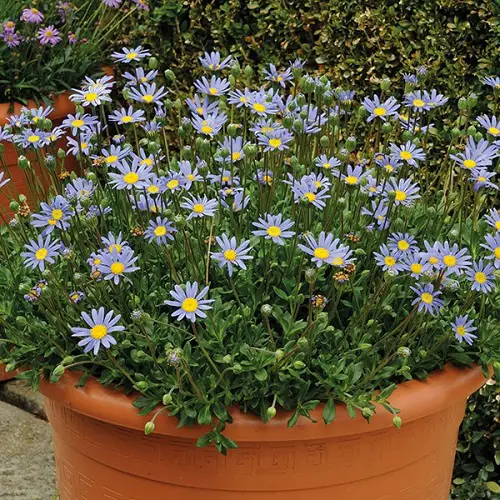
Botanical Name: Felicia amelloides
USDA Zones: 9-11
Size: 1-3 feet
Blue Daisy is a popular South African plant with lovely blue daisy-like flowers. Its dark green foliage complements the light shades of its blooms.
45. Blue Violets
Botanical Name: Viola sororia
USDA Zones: 3-7
Size: 0.5-1 feet
The beautiful blue violets are easy to grow – you just need to provide partial to full shade and moist soil.
46. Brunnera
Botanical Name: Brunnera macrophylla
USDA Zones: 3-7
Size: 1-2 feet
Brunnera, also known as Siberian Bugloss, is a perennial plant that is known for its attractive foliage and delicate blue flowers.
47. Canterbury Bells
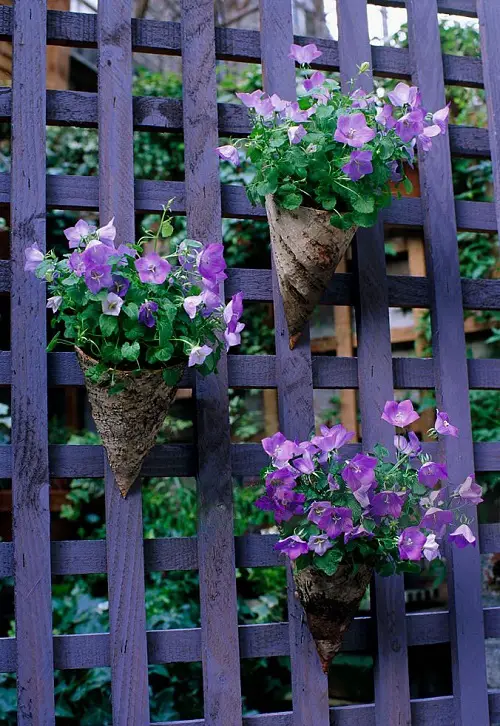
Botanical Name: Campanula medium
USDA Zones: 4-10
Size: 1-3 feet
The tall biennial Canterbury bells are interesting cups and saucer-shaped flowers available in shades such as pink, blue, purple, and white.
48. Chicory
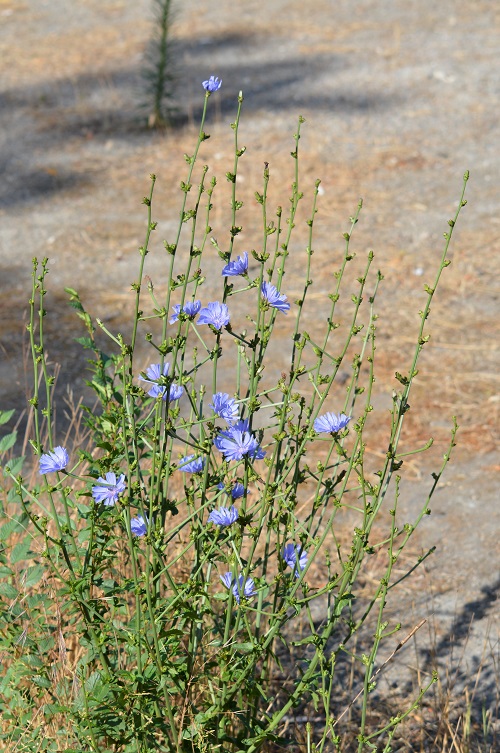
Botanical Name: Cichorium intybus
USDA Zones: 3-10
Size: 2-4 feet
Chicory is a hardy, perennial herb that often comes to mind when talking about blue flower names. It is grown for both its leaves and roots.
Learn about the Family of 210 Flowering Plants
49. Cornflower
Botanical Name: Centaurea cyanus
USDA Zones: 2-11
Size: 1-3 feet
Cornflower is a beautiful annual flowering plant that is easy to grow and produces stunning blue, pink, or purple flowers.
50. Catmint
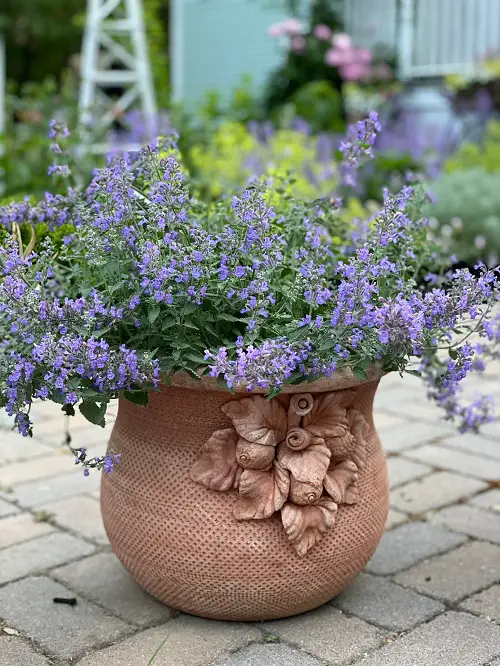
Botanical Name: Nepeta cataria
USDA Zones: 3-9
Size: 1-3 feet
Catmints have attractive foliage and are long-lasting blooms. They thrive for many years and look pretty.
51. Delphinium
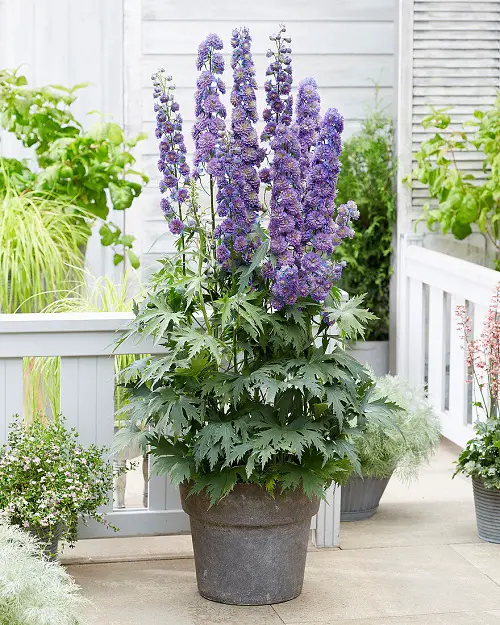
Botanical Name: Delphinium
USDA Zones: 3-7
Size: 2-6 feet
Delphiniums can be grown in gardens or containers. But they are perfect for creating a cottage garden and adding vertical interest to a garden bed.
52. Clematis
Botanical Name: Clematis x jackmanii
USDA Zones: 3-9
Size: 20-30 feet
Clematis produce large, showy flowers in a wide range of colors, including pink, purple, blue, white, and red.
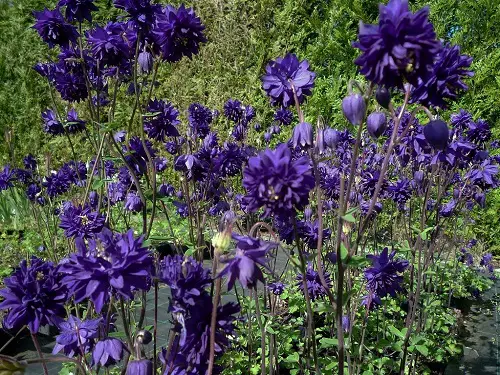
Botanical Name: Aquilegia vulgaris var. stellata
USDA Zones: 3-9
Size: 0.5-1 feet
Dwarf Blue Columbine is a compact and low-growing variety of the Blue Columbine. Their rich colors make them a popular choice among blue flowers names.
54. Slender Dwarf Morning Glory
Botanical Name: Evolvulus alsinoides
USDA Zones: 9-11
Size: 0.5-1 feet
Dwarf morning glory is a low-growing, trailing annual plant. Its spreading stems with tiny flowers catch everyone’s attention.
55. English Bluebell Creeper
Botanical Name: Hyacinthoides non-scripta
USDA Zones: 4-9
Size: 1-2 feet
English bluebell is a beautiful and easy-to-grow bulb that can add a touch of natural beauty to your garden.
56. Forget-Me-Nots
Botanical Name: Myosotis scorpioides
USDA Zones: 5-9
Size: 0.5-1 feet
Forget-me-nots are lovely cool-season plants that produce small blue, pink, or white flowers in spring.
16 Flowers that Grow from Petals
57. Flax Flower
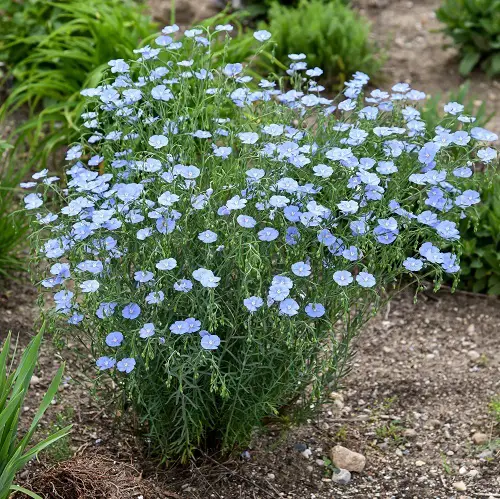
Botanical Name: Linum lewisii
USDA Zones: 4a-9b
Size: 1-2 feet
Flax flowers are a great addition to be grown in containers or used as a border plant. Their light foliage makes these flowers perfect to add some color.
58. Gentian
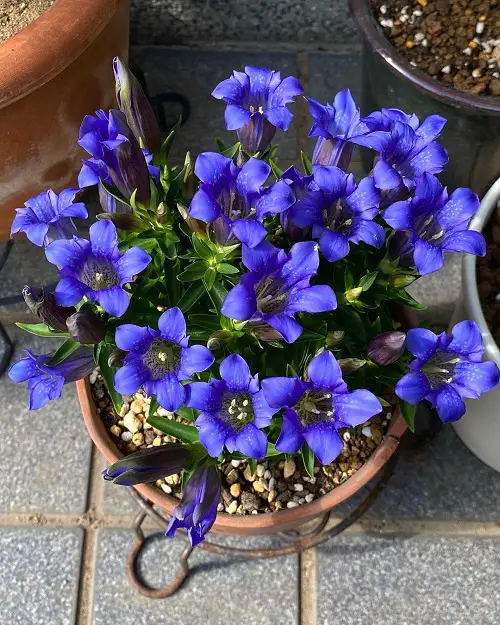
Botanical Name: Gentiana verna
USDA Zones: 4-7
Size: 0.5-1 feet
If you want beautiful blue flowers with a darker tone, Gentiana verna is the one you should go for.
59. Glory of The Snow
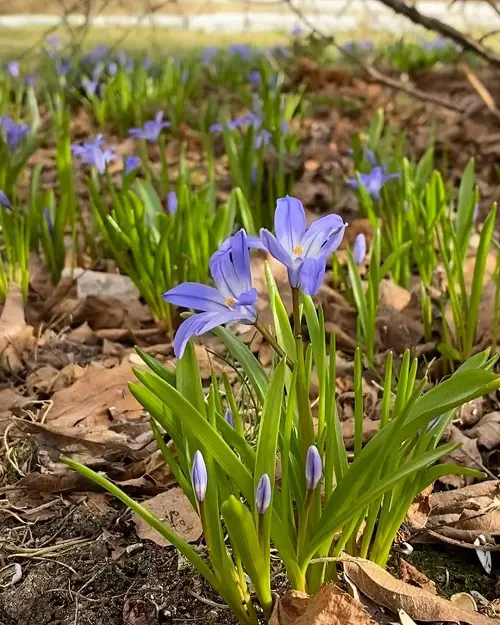
Botanical Name: Chionodoxa luciliae
USDA Zones: 4-9
Size: Less than 1 foot
Glory-of-the-Snow is a lovely flower that is perfect for rock gardens, borders, or naturalizing lawns.
60. Grape Hyacinth
Botanical Name: Muscari armeniacum
USDA Zones: 4-8
Size: Less than 1 foot
Grape hyacinths are small bulbous plants that produce clusters of fragrant, bell-shaped flowers in shades of blue, purple, and white.
Discover Flowers that Bloom in Late Fall and Winter in this Post
61. Grecian Wind Flower
Botanical Name: Anemone blanda
USDA Zones: 4-9
Size: Less than 1 foot
Grecian windflowers are small, early-blooming perennials that produce beautiful blue, white, or pink flowers.
62. Globe Thistle
Botanical Name: Echinops ritro
USDA Zones: 3-8
Size: 2-4 feet
Globe Thistle is a beautiful and unique plant that is well-suited for gardens and borders. It has a good height too.
63. Harvestbells
Botanical Name: Ornithogalum saundersiae
USDA Zones: 8-10
Size: 1-2 feet
The low-maintenance and unique bulbous harvest bells plants produce beautiful blue or white star-shaped flowers in the spring.
64. Himalayan Blue Poppy
Botanical Name: Meconopsis betonicifolia
USDA Zones: 7-8
Size: 3-4 feet
The Himalayan Blue Poppy requires some special care, but the reward of its stunning light blue blooms is well worth the effort.
65. Hydrangea
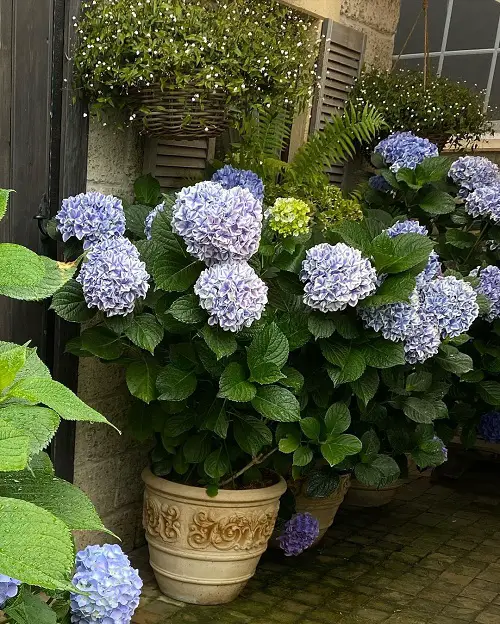
Botanical Name: Hydrangea macrophylla
USDA Zones: 3-9
Size: 4-6 feet
Hydrangeas are beautiful shrubs that produce large, showy flowers in shades of pink, blue, white, and purple.
66. Touch Me Not
Botanical Name: Impatiens
USDA Zones: 10-11
Size: 1-2 feet
Impatiens are popular annual flowers that come in a wide range of colors, including blue. Their delicate foliage adds to their beauty.
67. Lead Plant
Botanical Name: Ceratostigma plubaginoides
USDA Zones: 5-9
Size: 1-3 feet
Lead plant is a drought-tolerant shrub that is native to North America. It has faded green leaves that uplift the vibrant color of their blooms.
68. Lobelia
Botanical Name: Lobelia erinus
USDA Zones: All Zones
Size: 0.5-1 feet
Lobelia is a lovely annual flower known for its delicate, blue-purple blooms. It has thin leaves which are barely noticeable, making it a show-stopper.
69. Love in a Mist
Botanical Name: Nigella damascena
USDA Zones: 2-11
Size: 1-2 feet
The beautiful Love-in-a-mist is an annual flowering plant that produces blue flowers surrounded by a frilly collar of foliage.
70. Lungwort
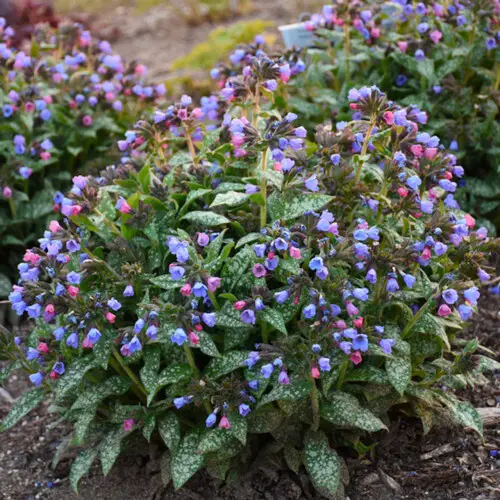
Botanical Name: Pulmonaria saccharata
USDA Zones: 3-8
Size: 1-2 feet
Lungwort is a lovely perennial plant that produces beautiful blue and pink flowers in spring. It also has leaves covered in pretty spots.
71. Meadow Sage
Botanical Name: Salvia nemorosa
USDA Zones: 3-8
Size: 1-3 feet
Meadow sage is a member of the mint family and is grown for its attractive blue or purple flowers. The leaves of the plant are aromatic as well.
72. Mountain Larkspur
Botanical Name: Delphinium glaucum
USDA Zones: 3a-8b
Size: 2-4 feet
This perennial Mountain larkspur is native to the western United States. This is an easy-to-grow wildflower that adds color and interest to your garden.
73. Heavenly Blue Morning Glory
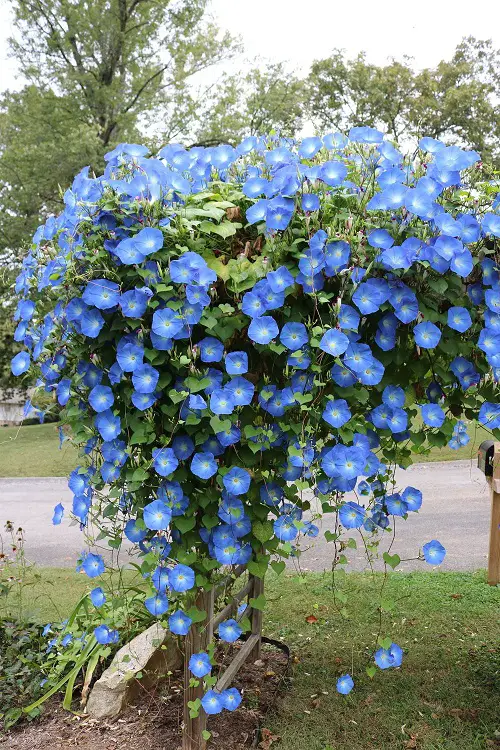
Botanical Name: Ipomoea tricolor
USDA Zones: 9-11
Size: 3-8 feet
Morning glories are beautiful annual climbing vines that grow quickly and can cover trellises, fences, and walls with light blue flowers.
74. Monkshood
Botanical Name: Aconitum
USDA Zones: 3-7
Size: 2-4 feet
Monkshood is a stunning blue flowering plant. You should handle it with care and keep it away from children and pets, as it is poisonous if ingested.
75. French Lavender
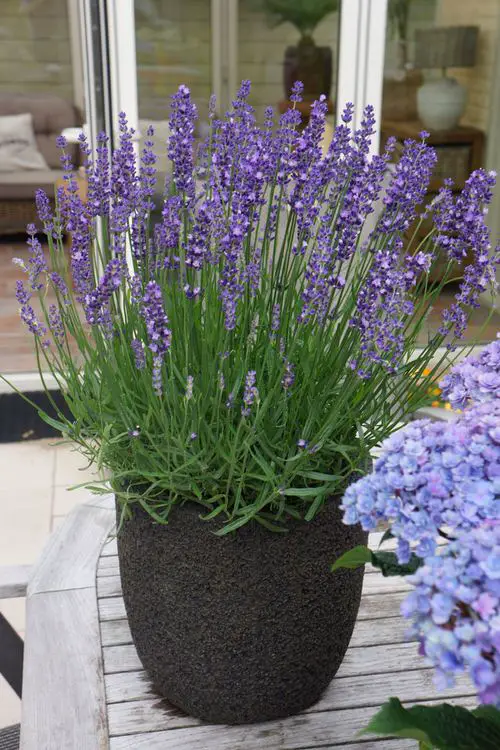
Botanical Name: Lavandula angustifolia
USDA Zones: 5-9
Size: 2-3 feet
With proper care, you can enjoy the beauty and fragrance of Oxford blue in your garden for years.
Look at the Beautiful Flowers that Start with O in this Post
76. Periwinkle
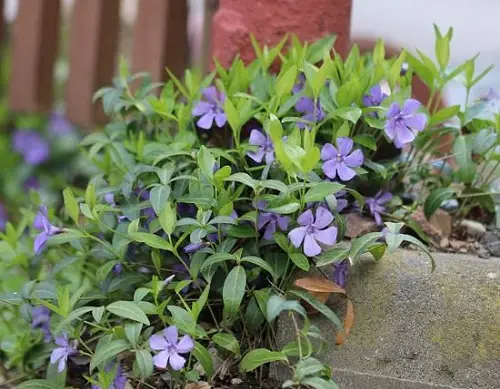
Botanical Name: Vinca minor
USDA Zones: 7-9
Size: 0.5-2 feet
The low-growing periwinkle is an evergreen ground cover plant that produces blue-purple flowers.
77. Petunia
Botanical Name: Petunia x hybrida
USDA Zones: 9b-11
Size: 0.5-1 feet
Petunias are popular annual flowers known for their vibrant colors. They are a great choice for garden borders, containers, and hanging baskets.
78. Pincushion Flower
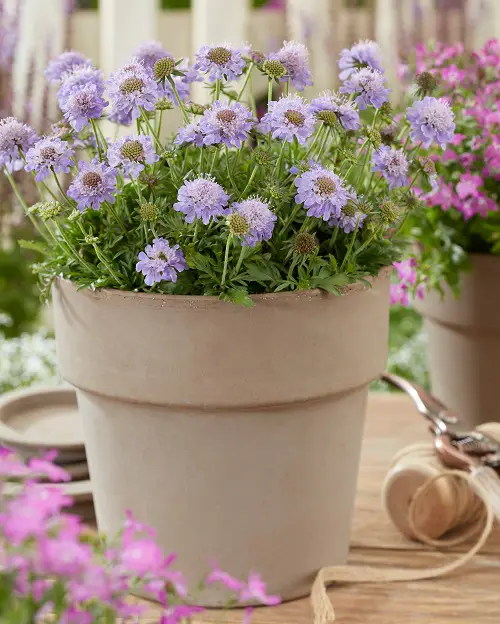
Botanical Name: Scabiosa
USDA Zones: 3-11
Size: 1-2 feet
The pincushion flower is a beautiful perennial plant that produces lovely blooms. These flowers have delicate petals and yellow centers.
79. Plumbago
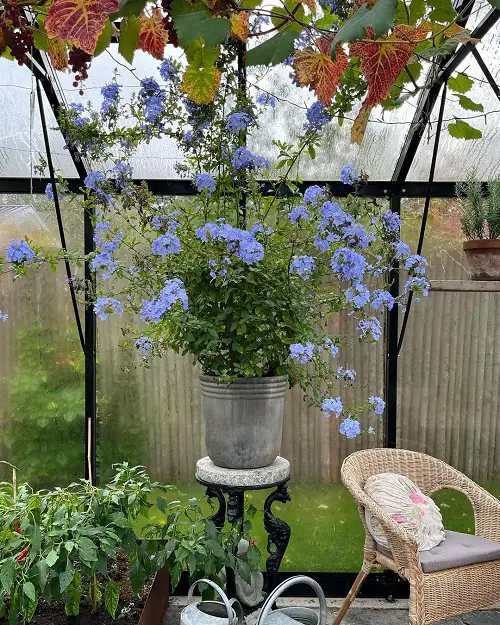
Botanical Name: Plumbago auriculata
USDA Zones: 8-11
Size: 3-10 feet
If you’re thinking of adding a splash of color to your garden or patio, pick Plumbago. Thank us later.
80. Rose of Sharon
Botanical Name: Hibiscus syriacus
USDA Zones: 5-9
Size: 8-12 feet
The Rose of Sharon can be grown as a specimen plant or as a hedge. With proper care, they can provide beautiful blooms and foliage year after year.
81. Russian Sage
Botanical Name: Perovskia atriplicifolia
USDA Zones: 4-9
Size: 3-5 feet
Russian sage is known for its aromatic, silvery-gray foliage. But what steals the show is its tall spikes of lavender-blue flowers.
82. Salvia
Botanical Name: Salvia splendens
USDA Zones: 9-11
Size: 1-3 feet
Salvia is known to attract pollinators, such as bees and butterflies. You should grow these if you’re making a wildlife-friendly garden.
83. Sea Holly
Botanical Name: Eryngium maritimum
USDA Zones: 4-9
Size: 2-3 feet
Sea Holly is a great choice to create a striking focal point or accent plant. It has thorny leaves, so you should wear gloves while handling it.
84. Spiderwort
Botanical Name: Tradescantia
USDA Zones: 3-11
Size: 1-3 feet
Spiderwort has pretty blue flowers with yellow stamens that add to its appeal. It is a nice addition to lawns and backyards.
85. Siberian Squill
Botanical Name: Scilla sibirica
USDA Zones: 2-8
Size: Less than 1 foot
The Siberian Squill is a small bulbous plant that produces beautiful blue flowers. Its flowers are like bells, tilting downward.
Stunning Vines with Pink Flowers
86. Summer Snapdragon
Botanical Name: Angelonia
USDA Zones: 9-11
Size: 1-2 feet
If you live in a sunny place, then you may try your hands on summer snapdragon. It loves the heat and will definitely thrive.
87. Swan River Daisy
Botanical Name: Brachyscome iberidifolia
USDA Zones: 8-10
Size: 0.5-1 feet
To enjoy the beauty of Swan River Daisy in your garden for many years to come. Save the seeds for next year and allow the flowers to dry on the plant before collecting them.
88. Speedwells
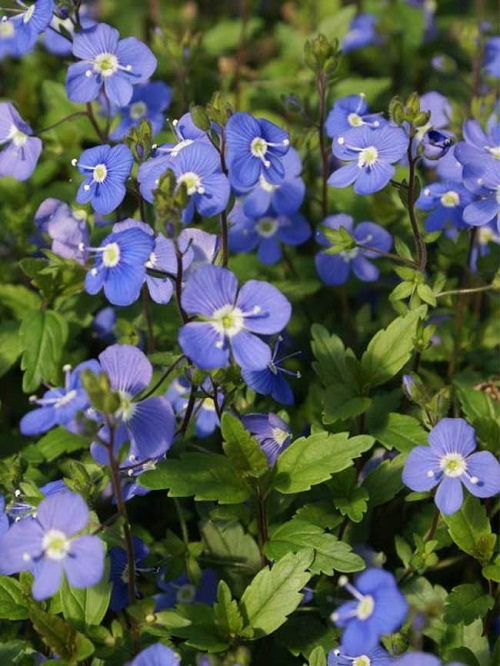
Botanical Name: Veronica
USDA Zones: 4-11
Size: 0.5-3 feet
Speedwells are low-growing, mat-forming perennials that are grown for their small, star-shaped flowers in shades of blue, purple, white, and pink.
89. Veronica Georgia Blue
Botanical Name: Veronica peduncularis
USDA Zones: 4-6
Size: Less than 1 foot
Veronica Georgia Blue is a specific variety of Veronica – that is a low-growing, spreading groundcover with tiny, dark blue flowers.
90. Virginia Bluebells
Botanical Name: Mertensia virginia
USDA Zones: 3-8
Size: 1-2 feet
Virginia Bluebells are low-maintenance plants with mini blue-lavender flowers. The best time to plant these is in early spring.
10 Indoor Plants that Grow Rare Beautiful Flowers
91. Pansy
Botanical Name: Viola tricolor var. hortensis
USDA Zones: 2-11
Size: Less than 1 foot
Viola pansies are a great choice for garden borders, containers, and hanging baskets. Their dark petals and yellow centers make them absolutely beautiful.
92. Blue Anemone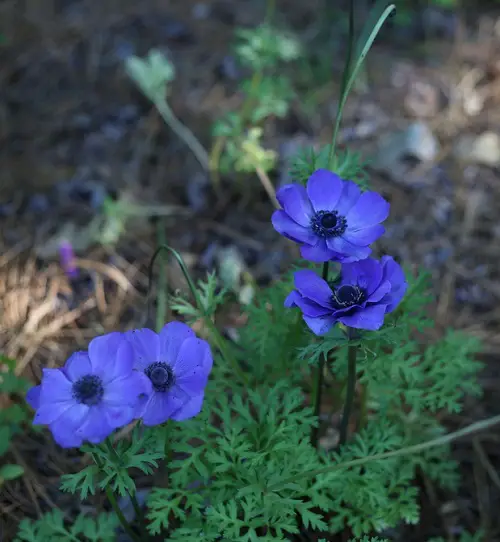
Botanical Name: Anemone coronaria
USDA Zones: 7-10
Size: 1-2 feet
Our blue flower names list will be incomplete without the blue Anemone. What makes them stunning are their pretty petals and dark centers.
93. Bluestar Flower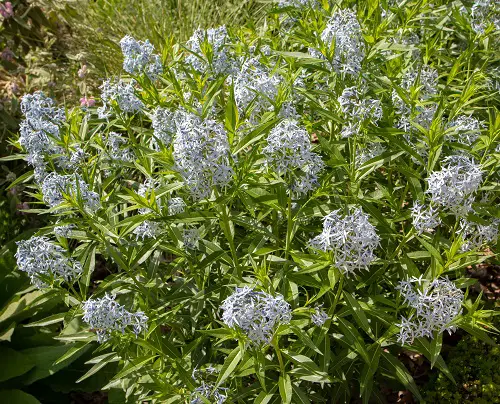
Botanical Name: Amsonia tabernaemontana
USDA Zones: 3-9
Size: 1-3 feet
This plant has small clusters of blue flowers and reaches a height of 1-3 feet. The blooms are shaped like mini stars.
18 Types of Funeral Flowers | Best Sympathy Plants
94. Blue Cardinal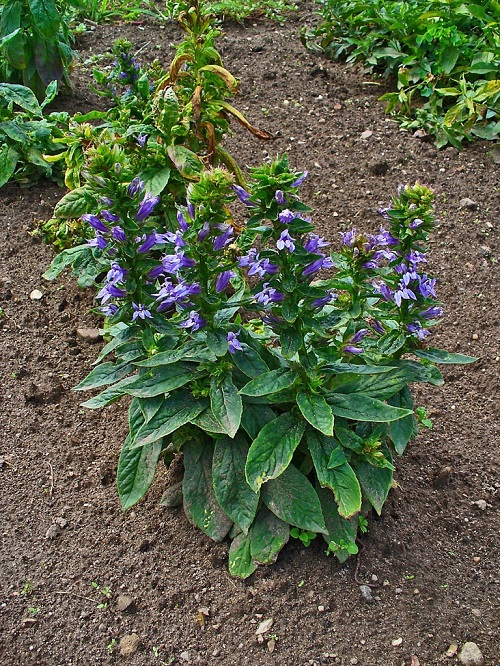
Botanical Name: Lobelia siphilitica
USDA Zones: 4-9
Size: 2-4 feet
The blue Cardinal belongs to the Campanulaceae family. It has tall, slender stems covered in beautiful foliage and blue flowers.
95. Bluebell of Scotland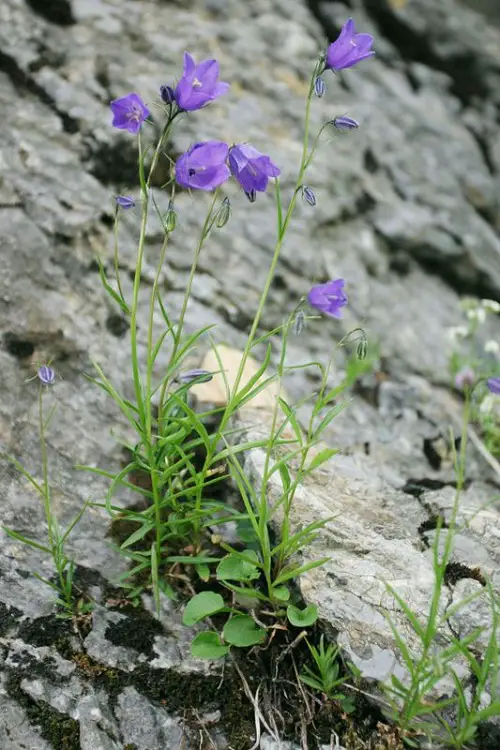
Botanical Name: Campanula rotundifolia
USDA Zones: 3-7
Size: 0.5-1.5 feet
For a lighter shade, you can also go with the Bluebell of Scotland. It will add a peaceful and calm vibe to the atmosphere.
96. Blue Lace Flower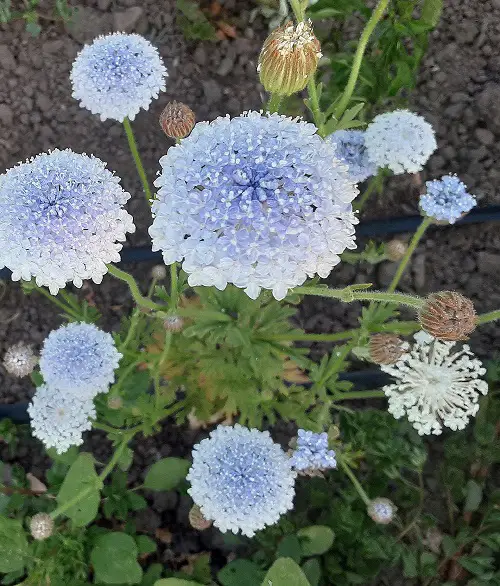
Botanical Name: Trachymene coerulea
USDA Zones: 5-10
Size: 1-3 feet
These small flowers have a delicate appearance and also give off a subtle fragrance that does not irritate the nose.
14 Pretty Flowers That Means Forever
97. Pitcher Sage
Botanical Name: Salvia azurea var. grandiflora
USDA Zones: 5-9
Size: 3-5 feet
The Pitcher Sage has large, two-lipped flowers and light green foliage. The leaves of the plant are also covered in tiny white hair.
98. Blue-eyed Mary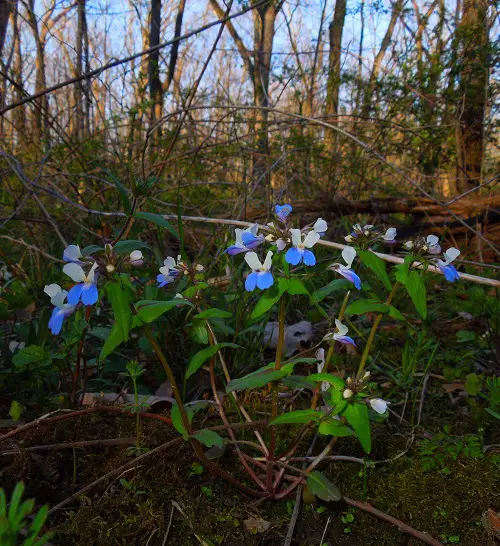
Botanical Name: Collinsia verna
USDA Zones: 3-9
Size: 1-2 feet
You shouldn’t miss out on the Blue-eyed Mary as it has dual-toned blue and white flowers.
99. Blue Thimble Flower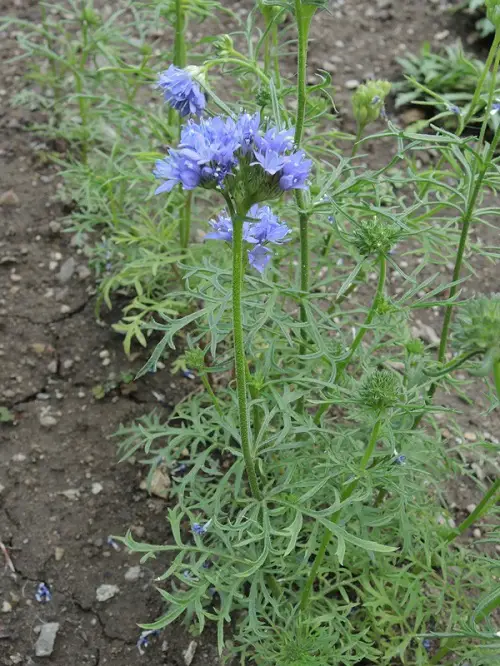
Botanical Name: Gilia capitata
USDA Zones: 7-10
Size: 1-2 feet
This plant is covered in tiny clusters. Each of these clusters has nearly 50-100 powdery blue flowers.
100. Blue Cup Flower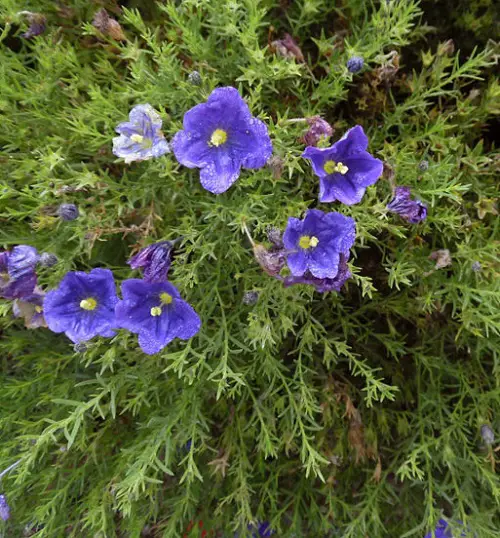
Botanical Name: Nierembergia caerulea
USDA Zones: 7-10
Size: 0.5-1 feet
The flowers of this one are a light blue shade with darker veins around its yellow centers. It is a nice choice for containers and indoors.
101. Blue Dampiera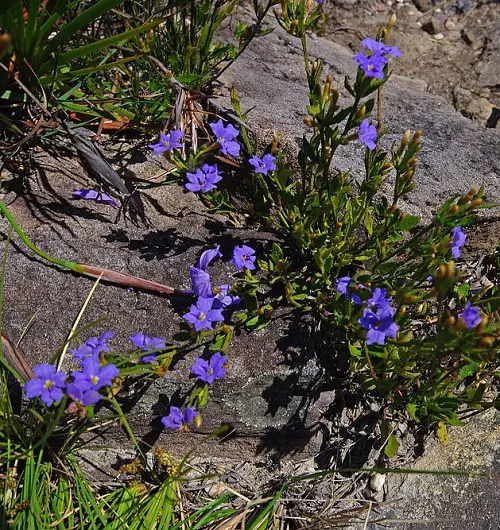
Botanical Name: Dampiera diversifolia
USDA Zones: 9-11
Size: 0.5-3 feet
If you’re looking for a lush blue flowering ground cover, the blue Dampiera is the one you should go for.
102. Blue Mistflower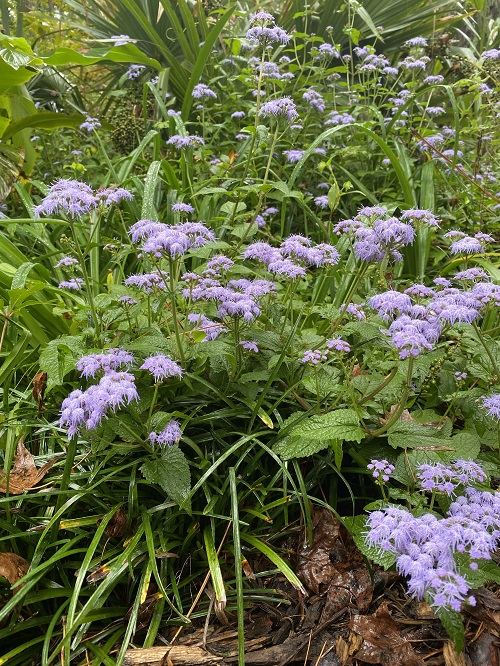
Botanical Name: Conoclinium coelestinum
USDA Zones: 6-10
Size: 1-3 feet
This one has delicate, frilly flowers in lavender-blue hues that everyone loves.
103. Blue Amaryllis
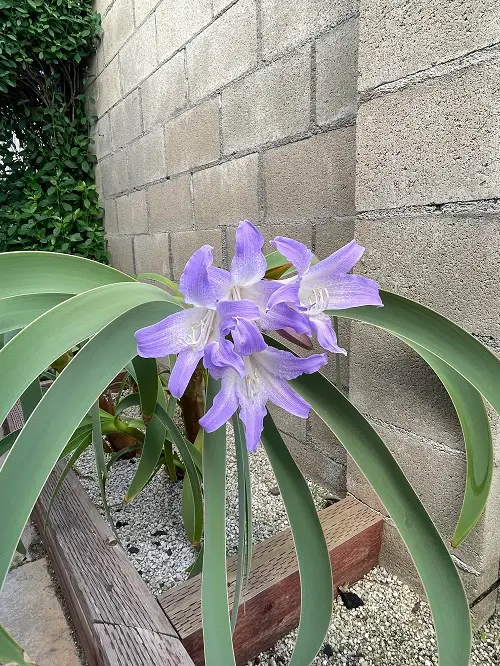
Botanical Name: Worsleya procera
USDA Zones: 9-11
Size: 3-5 feet
Worsleya procera, famously known as the Blue Amaryllis, is loved for its sky-blue trumpet-shaped blooms. Its arching leaves and electric-blue petals make it a dream plant for collectors! However, this South American native is not easy to grow and needs warm growing conditions to thrive!


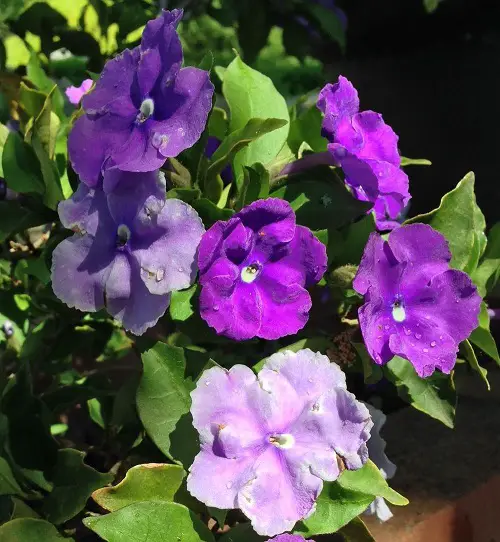
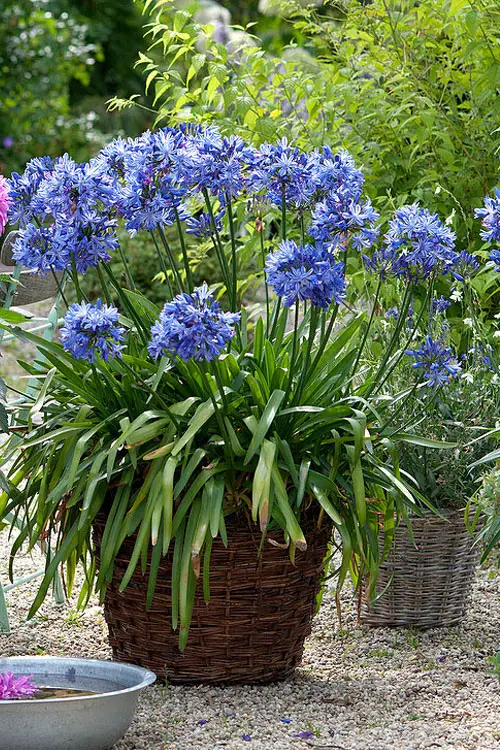
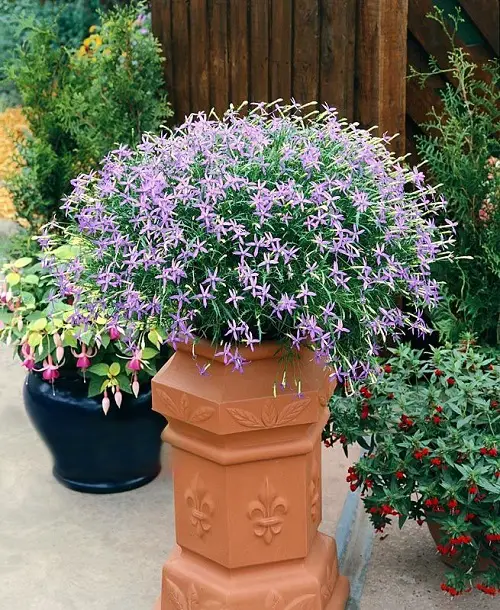
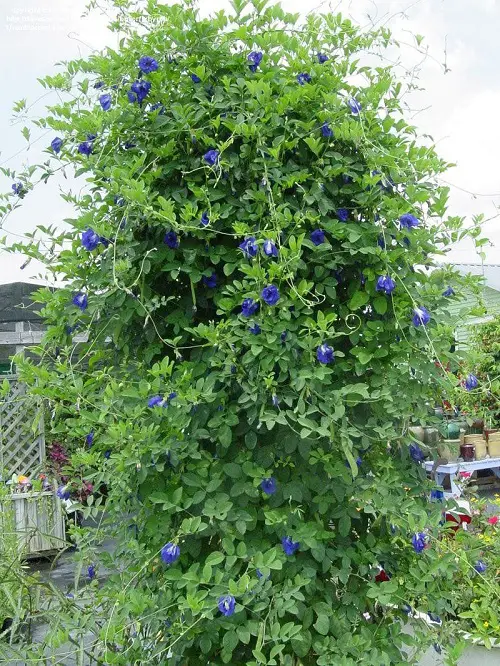
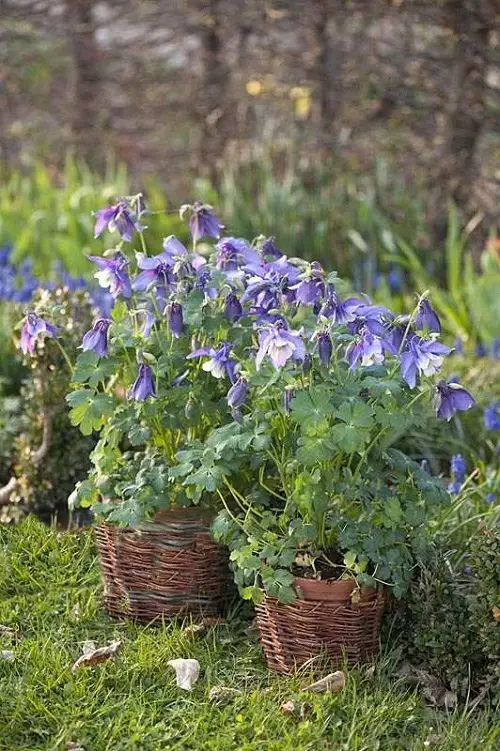
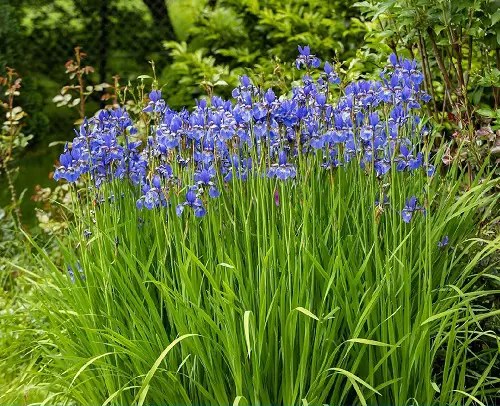
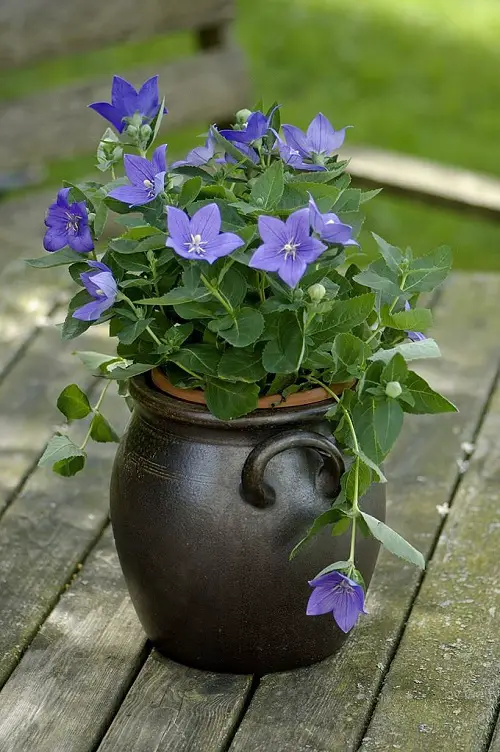
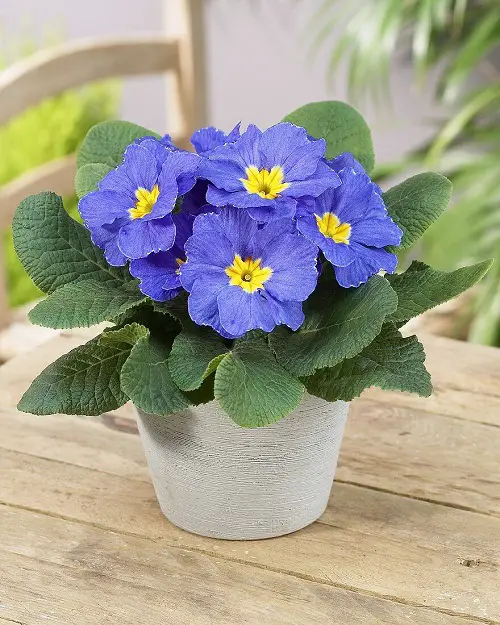
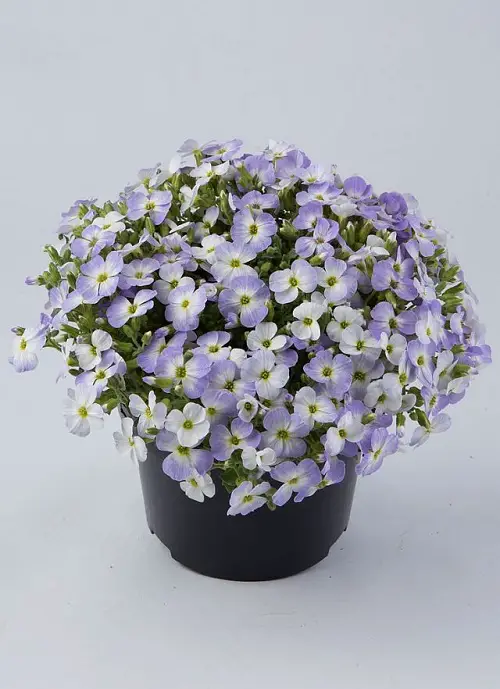
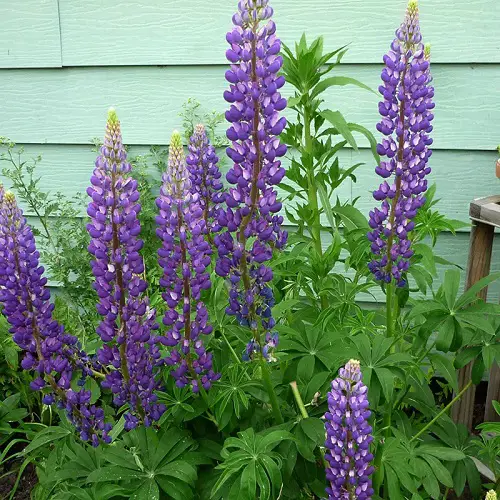
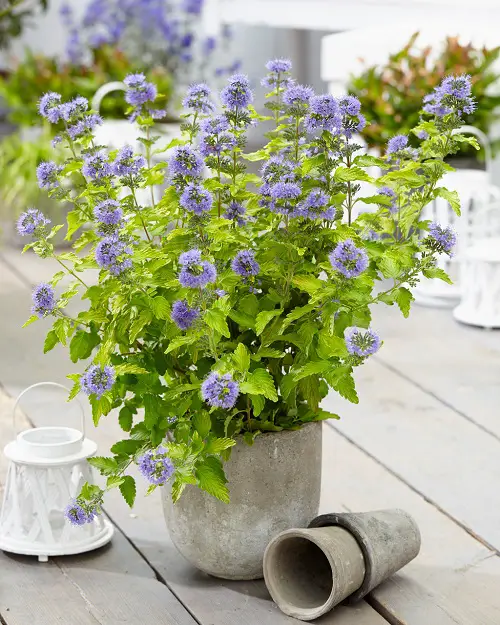
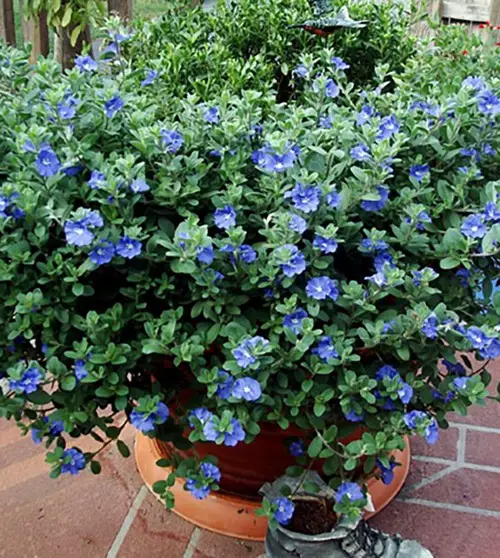
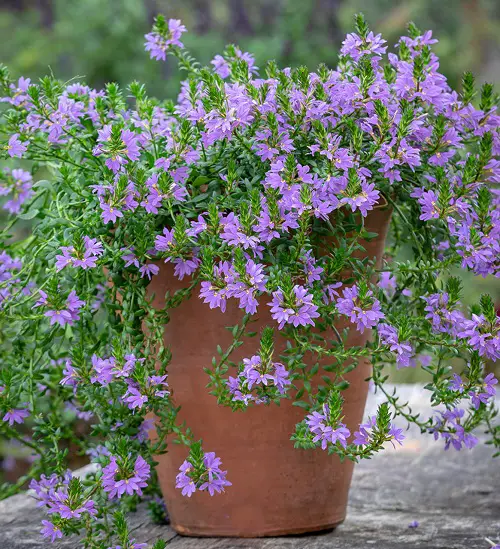
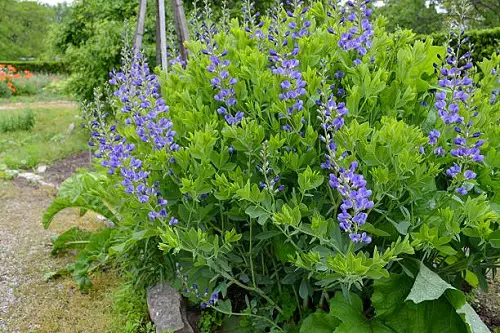
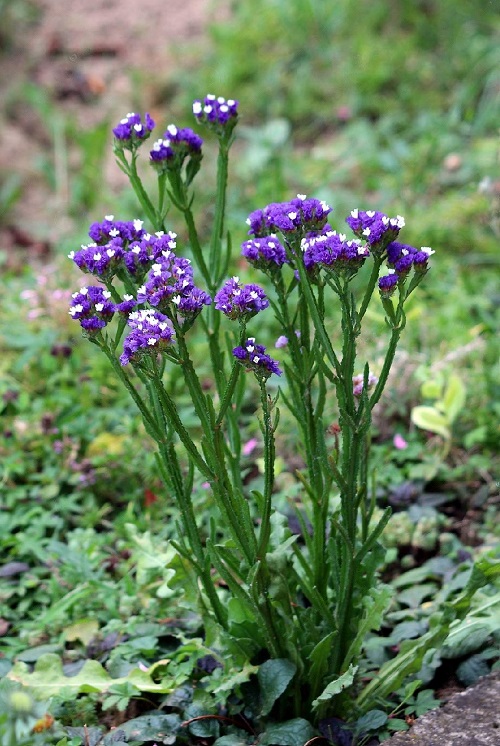
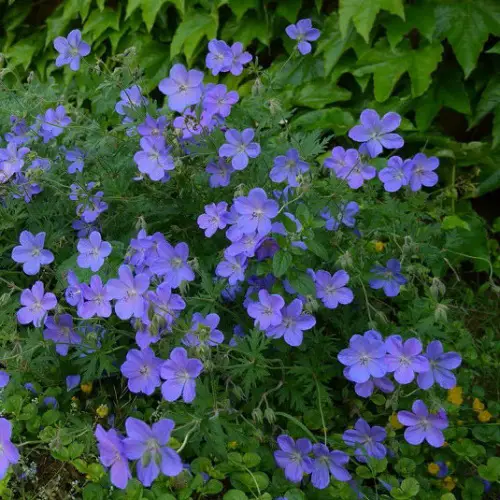
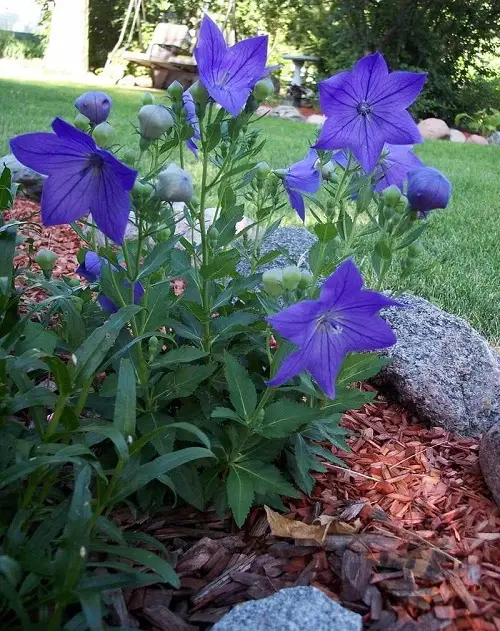
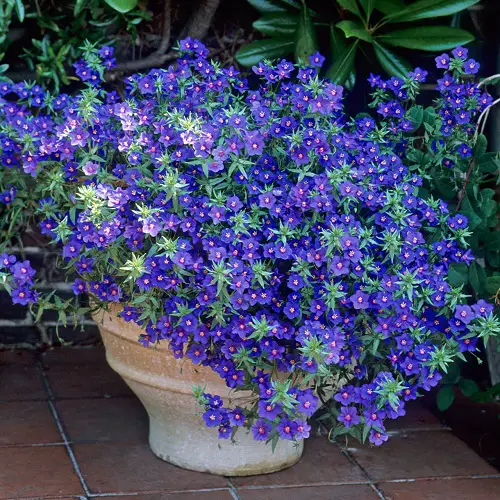
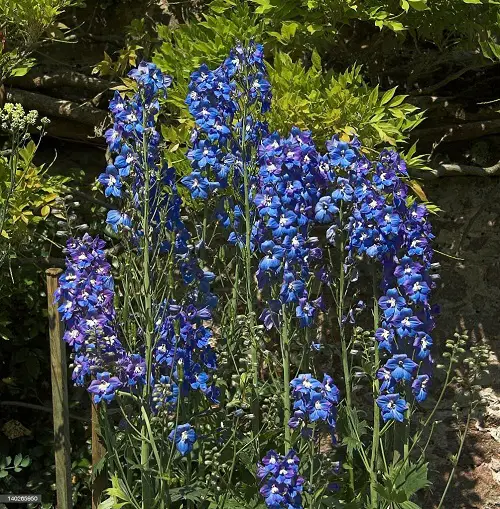
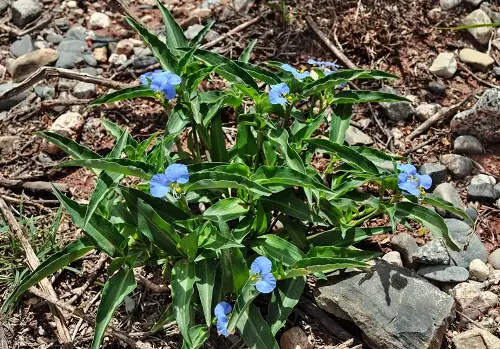
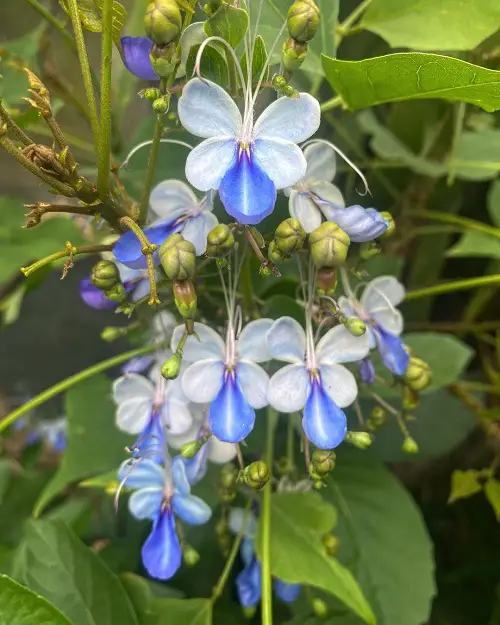
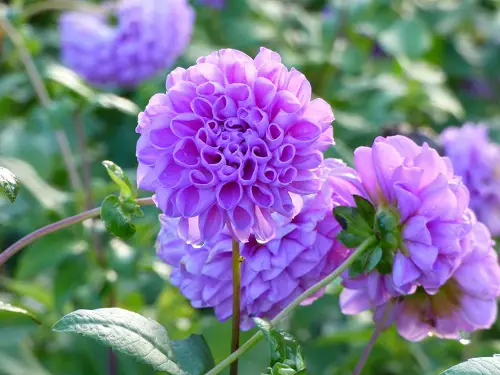
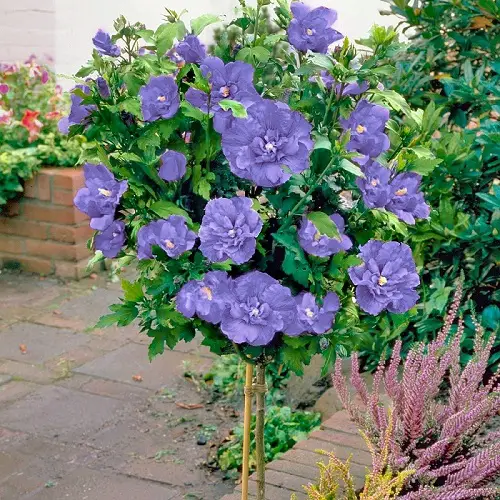
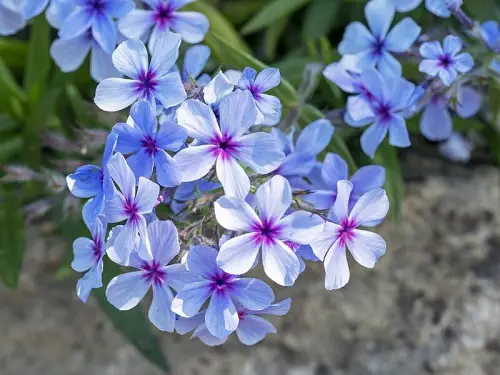
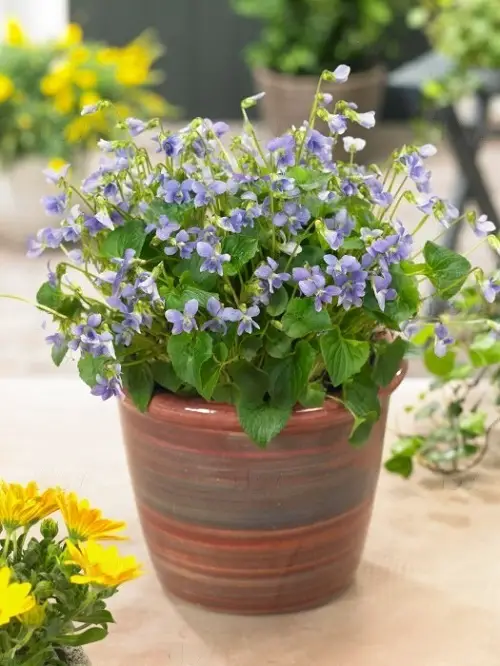
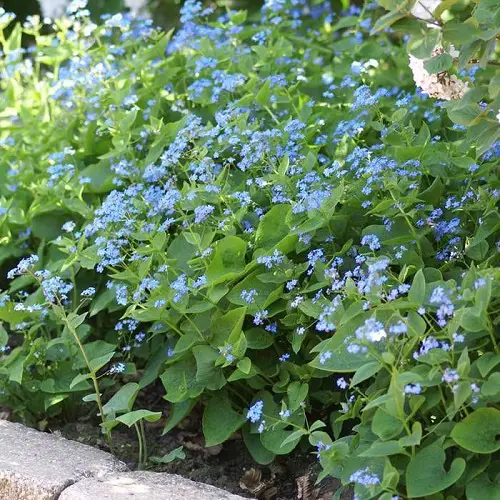
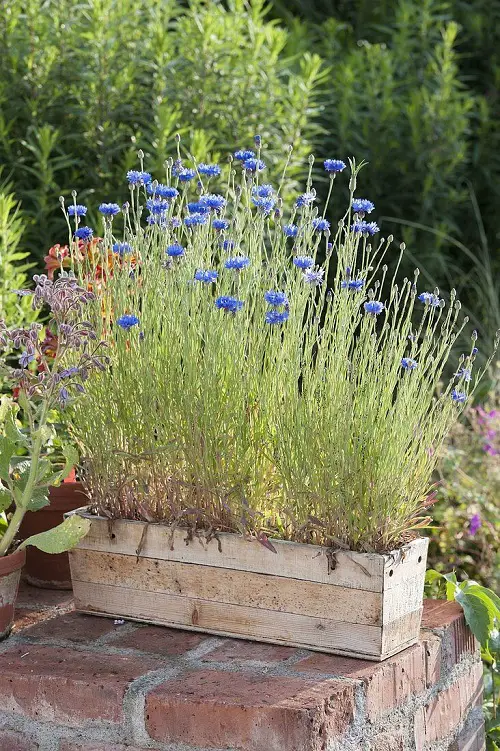
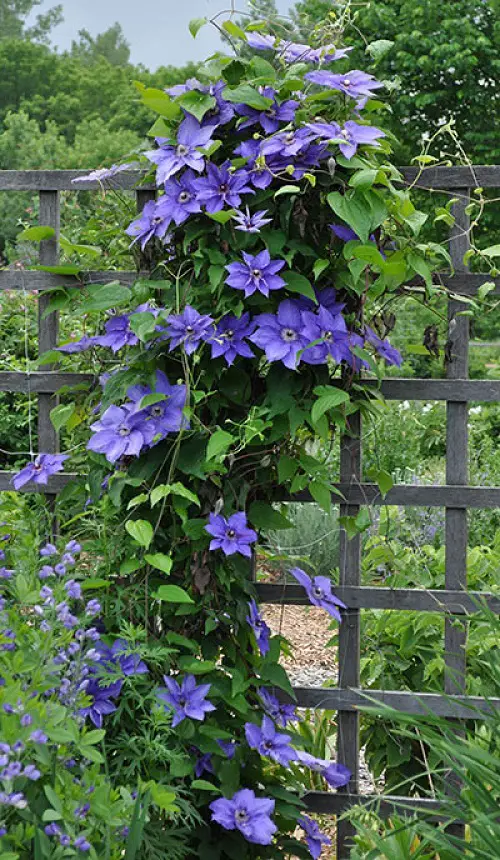
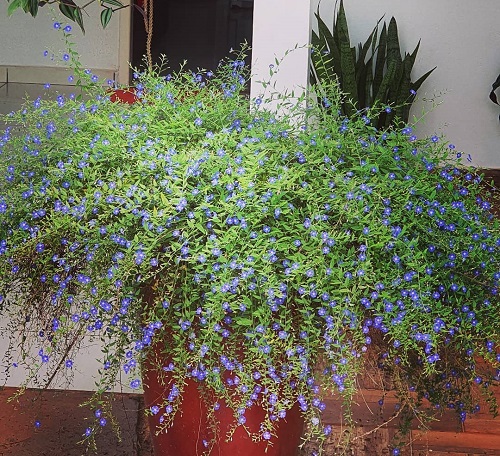
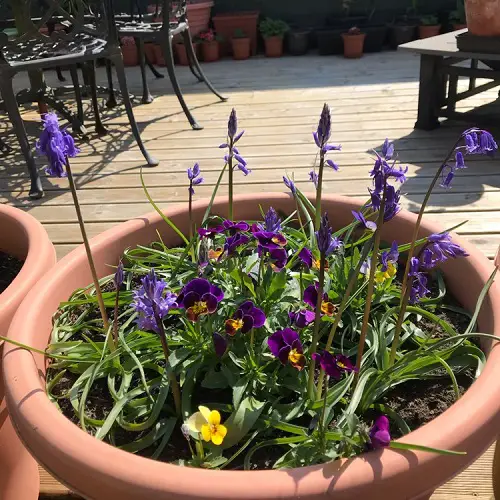
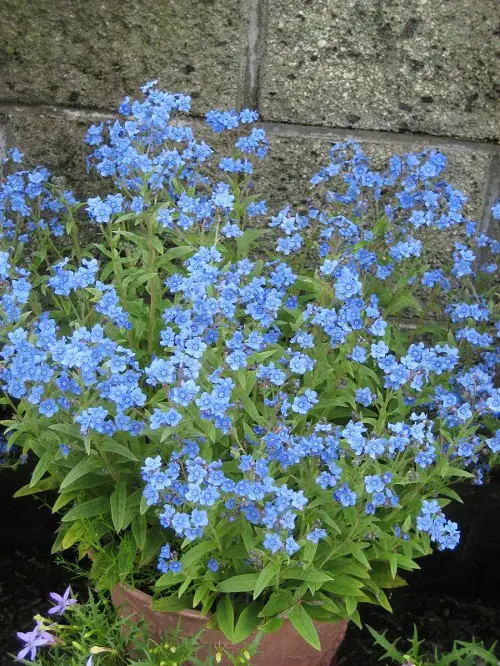
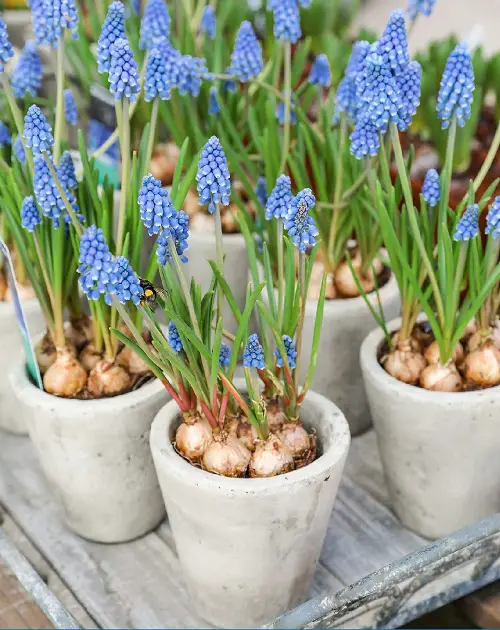
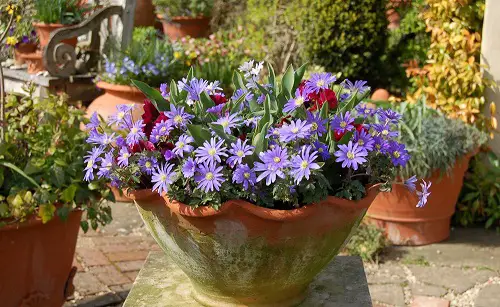
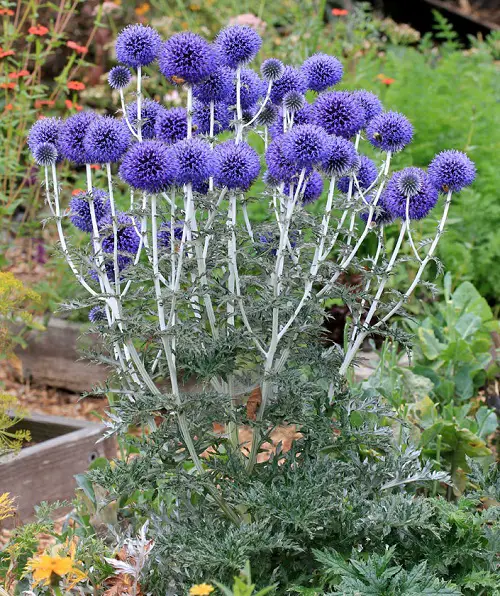
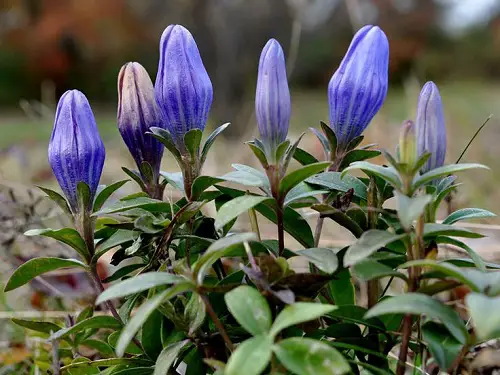
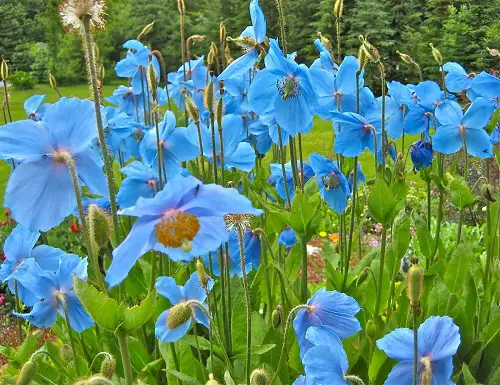
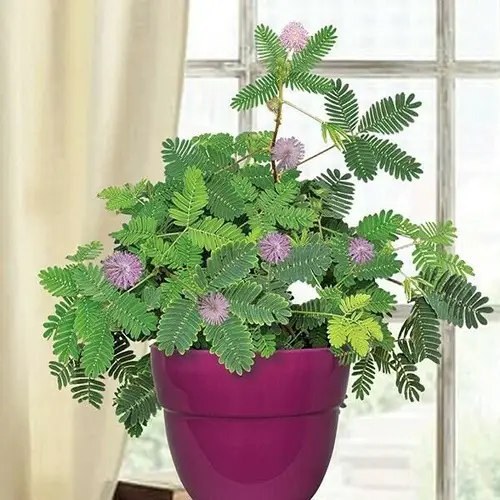
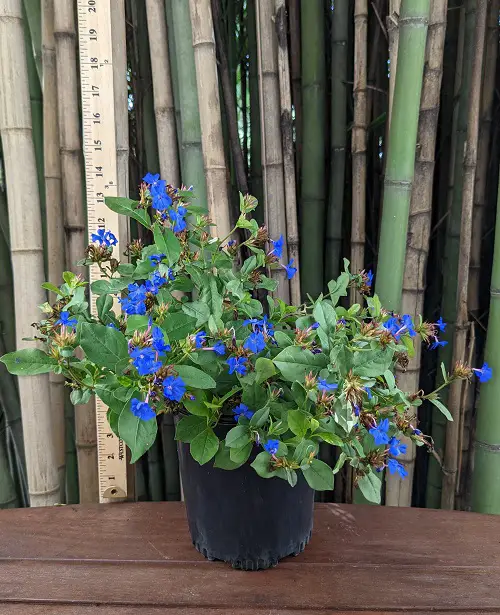
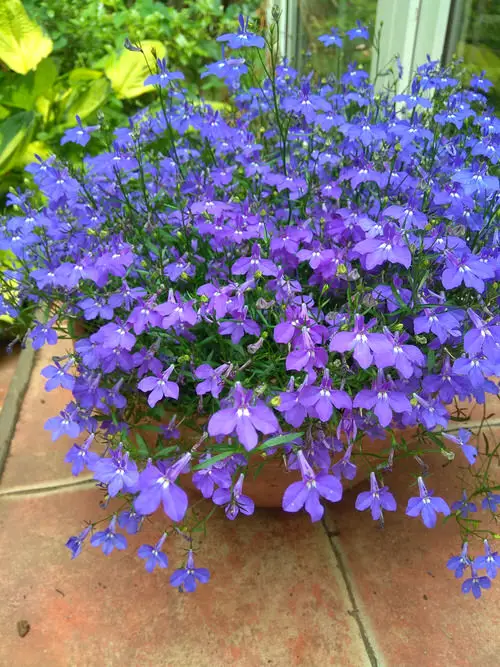
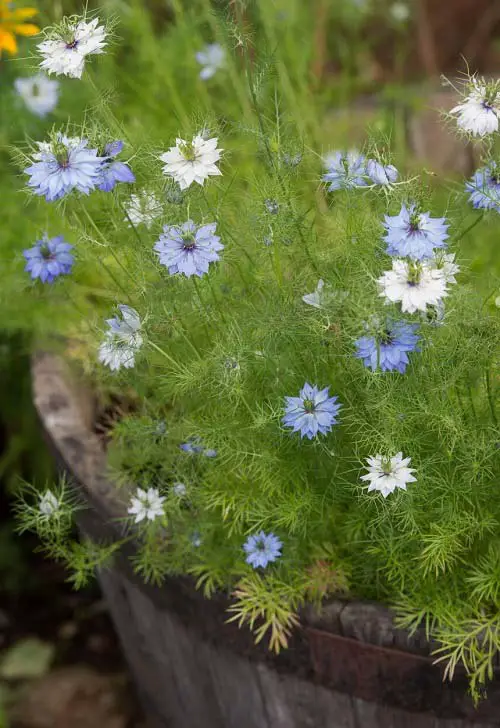
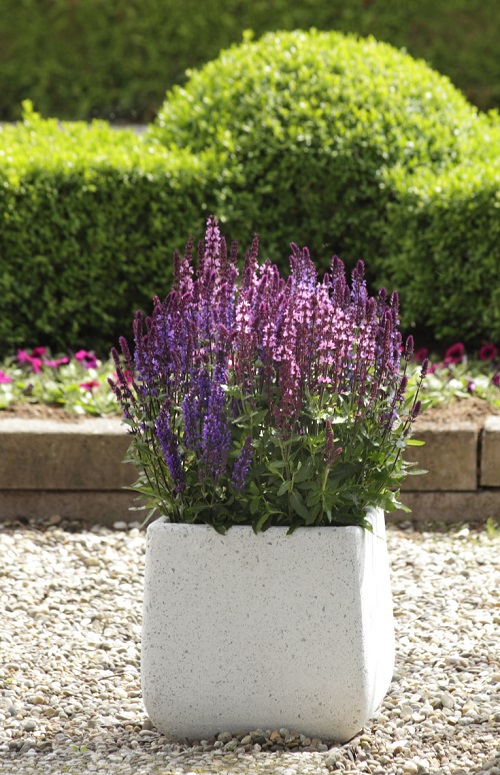
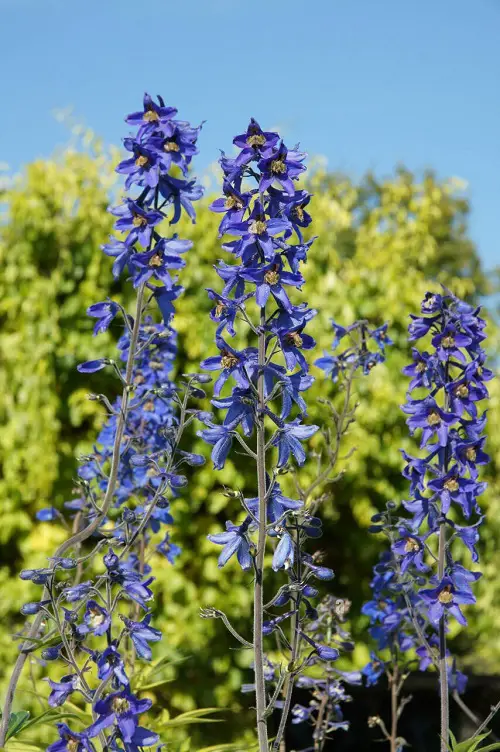
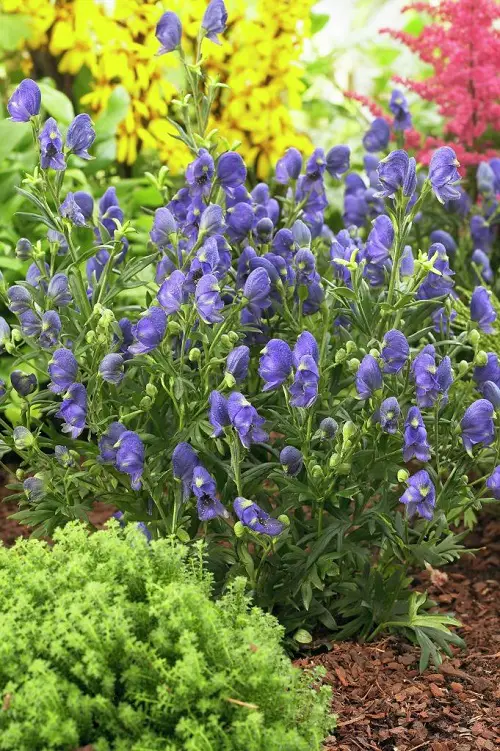
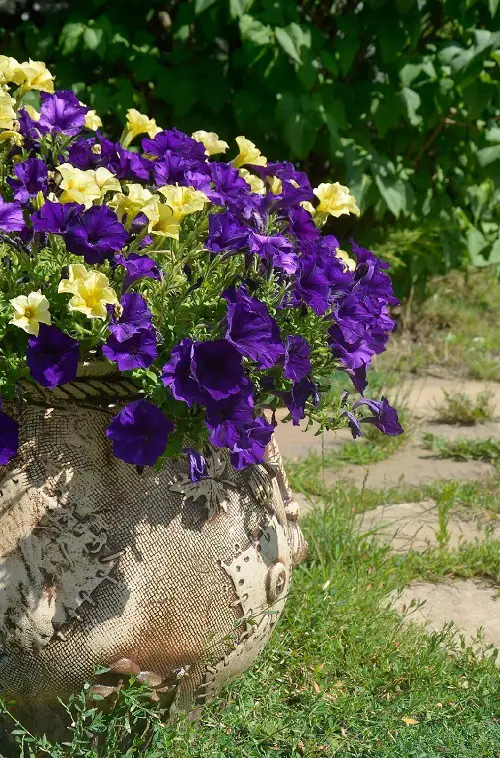
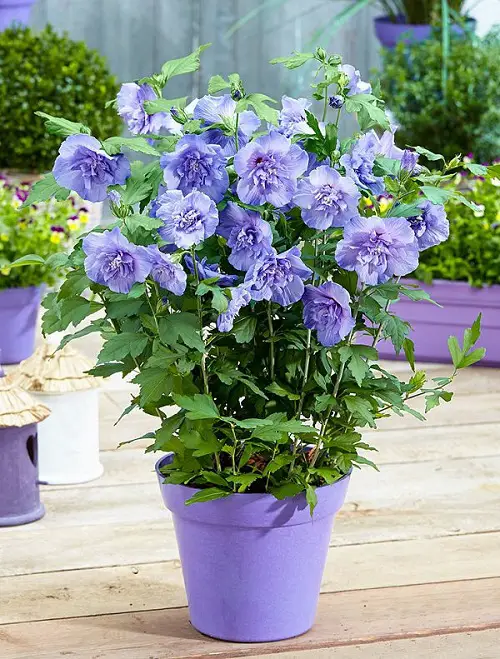

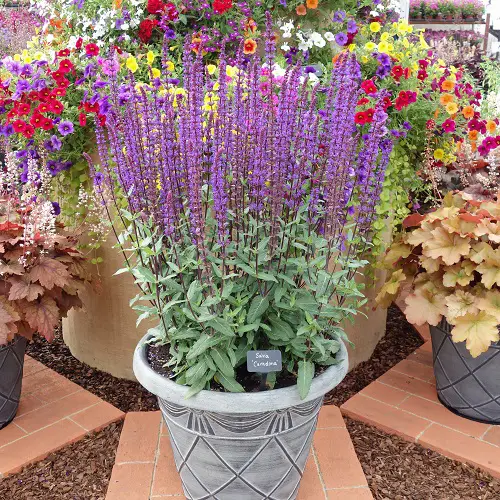
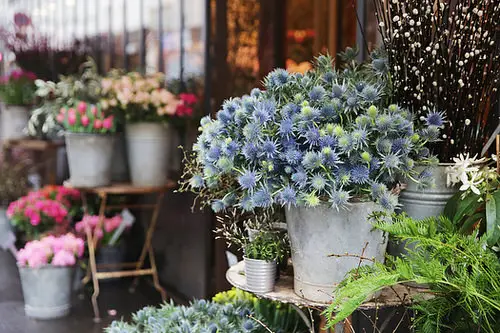
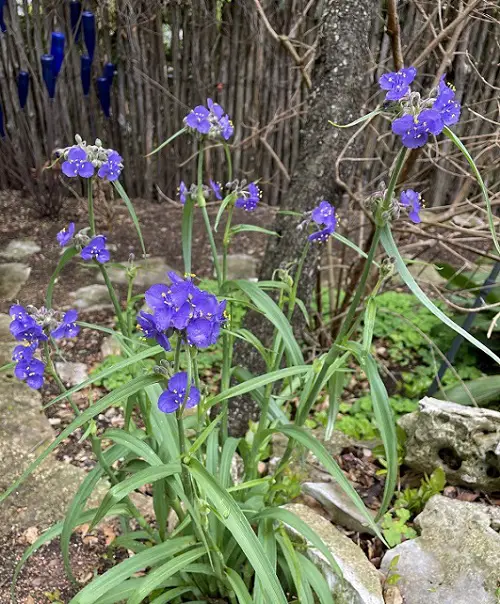
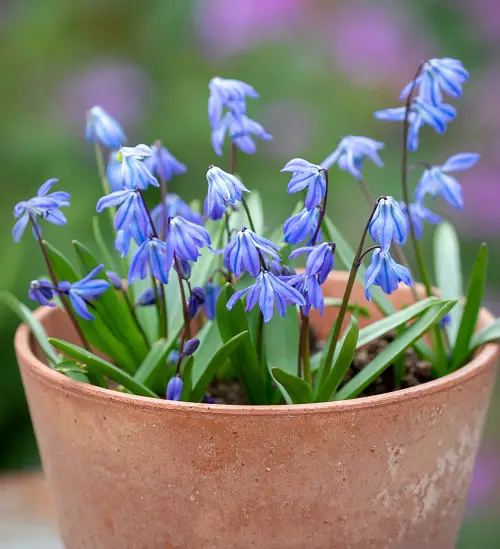
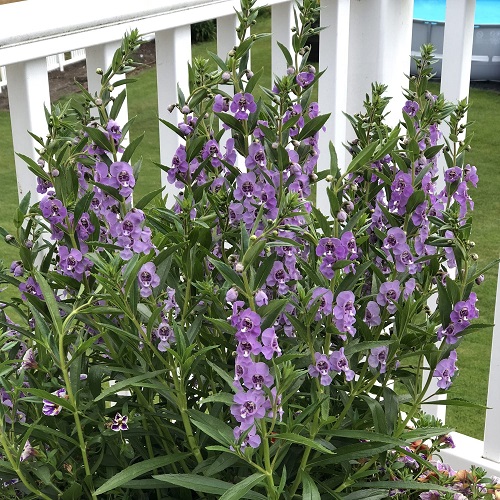
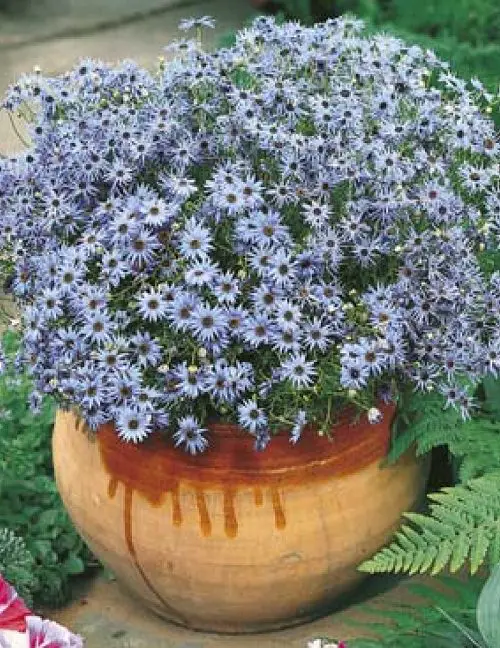
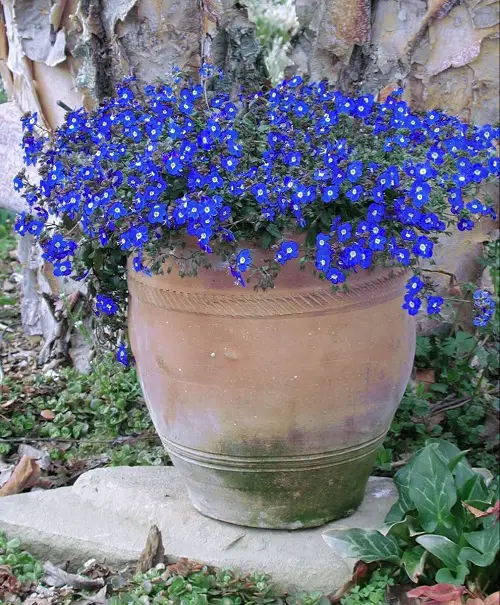
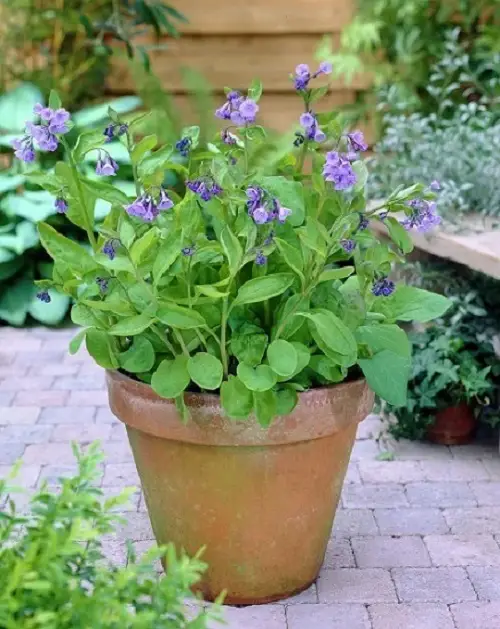
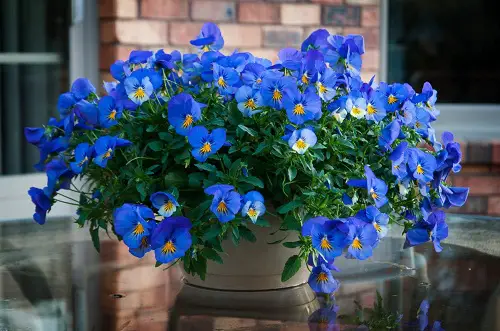

You left out plumbago!!
#79 Plumbago♥️☺️
I loved your presentation of your blue flowers. I never knew that there were so many flowers in the blue shades. Thank you. “M C” .